#the same fundamental arc but in the opposite direction
Text
The parallel of Forever being let down by Cellbit when Cell "betrayed" him to work undercover for the Federation, forcing Forever to become the new leader of the Ordo and vowing to get Cellbit back vs Cellbit being let down by a Forever already in a position of power who has completely shut down, making Cellbit resort to heading an operation to save him from himself
#the same fundamental arc but in the opposite direction#Cellbit made deliberate decisions that led to the conflict while Forever's harm came from inaction#both situations forced them to step up as leaders#and both times they vowed to save each other#mcyt#qsmp#cellbit#forever player#insane duo
100 notes
·
View notes
Text
today's hot take: i don't read Fionna and Simon's relationship as parental at ALL, because while their initial foreshadowing is heavily romantic in nature (Ice Prince being depicted as a Tuxedo Mask-esque handsome icon being Fionna's essential establishing character moment for Simon before she is initially annoyed by his sour attitude and then comes to know him better and then care about him), there's a few other points for them explicitly not having a father/daughter dynamic at all, but the biggest one is that they are fundamentally peers.
This might not be readily apparent because of their ages, but at the ages they're at and that inform their world view and relationships to others like them, they're pretty much in the same bracket. Fionna is in her 30s, while Simon was originally 47 when he got the crown, and nearly in his 60s at this point; while you may assume that her being almost literally half his age works against the interpretation of them having similar experiences, they ARE at the age where age differences honestly don't really mean that much and gradually become irrelevant in terms of lived experiences.
The bigger thing, though, is that their status as complementary story foils are the most relevant bit for their characters.
Fionna and Simon are foils to each other, with a nearly identical start to their character arcs: they BOTH long for a different sort of world than the one they got, but from opposite directions. Fionna lives in a mundane 9-to-5 world and wants a magical world of adventure. Simon is in that world (after living through the gradual process to make a mundane world into a magical one) but he wants the more mundane experience he remembers once, and he just can't feel that he belongs in Ooo, just as Fionna can't help but feel all wrong for her mundane world. While Simon doesn't have any interest in making Ooo boring and normal, he DOES latch on fast towards the idea of becoming Ice King again even as he clearly hates it, because he desperately fixates on the idea of being needed by others, even (no, ESPECIALLY) if it hurts him in the process.
They both want to be heroes, in their way, and resent being part of worlds that they feel they don't belong in anymore, and clearly ignore multiple opportunities to find magic or meaning in the world right around them, and SPECIFICALLY ignoring them in pretty much the same ways, to the point that the episodes Fionna Campbelll and Simon Petrikov parallel each other, not just in titles but in general progression; they go through a lot of similar circumstances, to the point of encountering the same sort of circumstances that they ignore or swat away. It's not the magic or normal they WANT... or perhaps wanting isn't even the right word. Their experiences or vague memories of the world they used to know keeps demanding to have something more like that; they ignore friends and family, or explicitly go out of their way to not tell them anything; Simon shuts down his feelings and won't tell Finn or Marceline anything (almost certainly because he feels like he would be bothering them) and while Fionna goes to her friends for help, she doesn't really confide in them.
This extends even to their songs, Not Myself and Part of The Madness; they both have very similar overtones of depression, feeling out of place, and fundamental loneliness. Its different in the particulars; Fionna is weighed down by the mundanity and changelessness of her world, feeling alone even with her friends. Simon glumly wants to help people but he CAN'T do anything without magic; no one needs anything from him, and people (he thinks) aren't happy to see him.
Fionna longs for an inexpressible time of magic and without it, she feels lost and empty. Simon wants to be needed and feels empty inside BECAUSE he thinks he's supposed to be better now, but all it does is make him feel upset and bad about being upset. Fionna's primary issue is that she's... lost, in a similar way. She remembers her world being magical but not clearly, much as the vague impressions Simon recalls his experience as Ice King; we don't even know WHAT her life has been like, and its entirely possible that everyone's life is a blurry hazy mess in the mundane world she's gotten, but she and Cake are the only ones with the awareness to work it out and be unhappy. Both Simon and Fionna can't help but remember how things used to be, or that they COULD be another way, and be endlessly lost in their own gloom and dissatisfaction.
Past the point where they actually meet and are starting to like each other's company (to the point that they remain in contact across the gulf of worlds post-minseries), these factors and their generall dynamic (Simon as a wet cat in a perpetual state of OH SHIT while Fionna tries her best to be a bruiser but unfortunately finds that in her life she doesn't have the skills or power to pull it off, leading to them BOTH feeling useless) make them both feel like peers; people with similar problems in the same boat. A lot of Fionna's character development comes from her slowly realizing what she's actually asking from Simon and her growing fear of making her world as dangerous or frightening as some of the places she's seen, while Simon has to come to terms with the fact that he really DOESN'T want to be Ice King again and that he needs to come to terms with it.
As a result of all that, they have a strong vibe of feeling like peers, not like a student and teacher or a similar dynamic.
(Also Fionna DID smooch Winter King with zero hesitation and while that didn't end well for anyone involved except PB, no one found this unusual in-universe. Except possibly Simon and HIS primary issue feels more like he thought of Winter King as a better version of himself in general and he got resentful about that.)
#adventure time#fionna and cake#fionna campbell#simon petrikov#analysis#meta#this is a very long winded way to say 'i get why people get intense about Simon's Dad Vibes but#i do not think it applies with him and Fionna at all'#related topic: I think fionna has a vibe of also taking care of her friends in her own way in the past#i don't really have evidence for this but it FEELS right??#queued#if so it would push her and Simon even further into similar territory
43 notes
·
View notes
Note
Thoughts on CROMA and why it is an objectively better ship then SOMA even though Soul is a good charachter still?
Ah, trying to objectivly break down ships huh? Thats always fun... and likely to piss people off. Sure, why not?
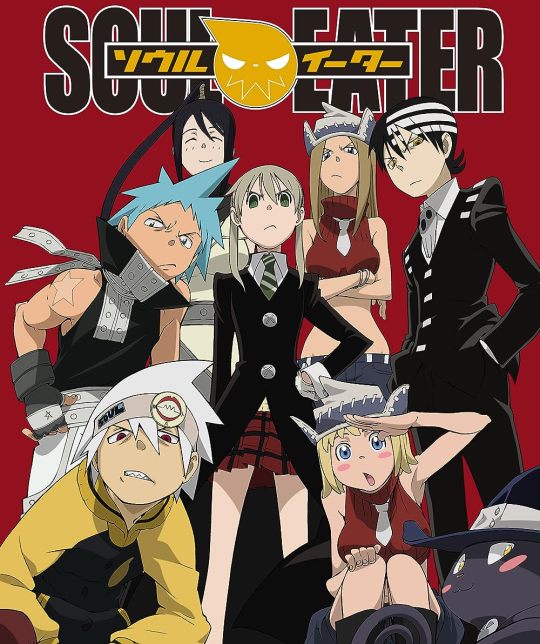
The problem with Soul X Maka as a pairing, is very much the same as the problem with all the rest of the meister x weapon combinationa from the 3 main cast combination.
All 3, Maka x Soul, Kid x liz/patty and Black Star x Tsubaki.
All of these have a strong foundation... But don't really use that foundation as the basis for their developments as the series progresses.
Black Star and Tsubaki have an excelent character outing when they go to confront her brother, but not really much afterwards.
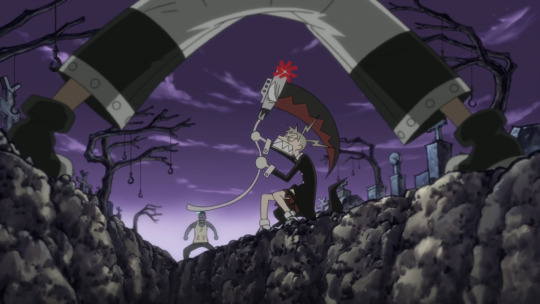
However, while Black Star and Tsubaki's dynamic is all about the fact that they fit together surpeisingly well despite their flaws and quirks, Maka and Soul are the exact opposite.
Despite having worked together long enough to be at the cusp of turning Soul Eater into a deathscythe, the two of them have an absolutely miserable dynamic, fueled almost entierly by Maka's shortcomings at the start of the series.
This is not a bad thing at all mind you, as character flaws and overcoming them are the aoul of any well written arc, and for obvious reasons, you can get a very good romance out of two people helping the other grow.
That is literarily what makes Crona and Maka such a good dynamic in how their relationahip fuels both plot and character development by just being near each other.
However that's not quite the way Soul and Maka is handled.
Because the point that is emphazied at the start of the series is that Soul is much more along the path of his own development than Maka is.
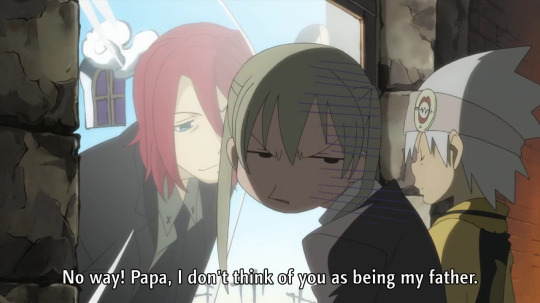
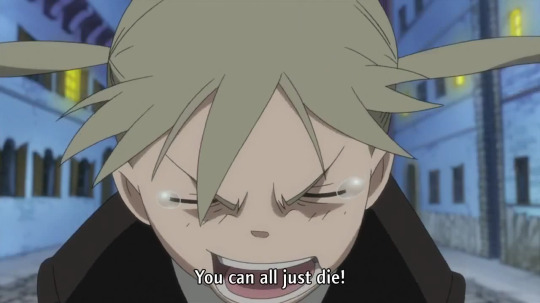
Maka is fueled by all of her worst insecurities, her flaws and shortcomings, and so she fails utterly against Blair, Stein and Crona, losing all of her 3 first fights.
Her relationahip with her father is a total mess, while she lives in denial about her mom abandoning her, and she is alwqys stupidly quick to fly off the handle regarding soul because she is terrified he will leave her.
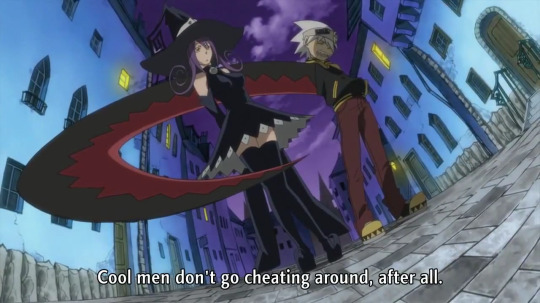
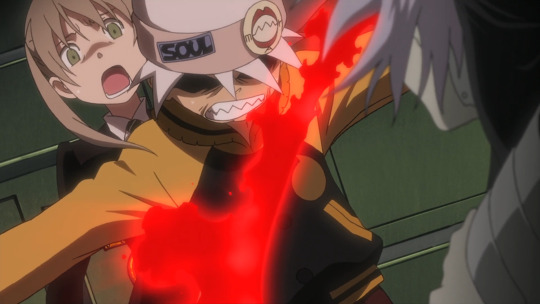
Soul by contrast is has his shit together much moreso, keeping a cool head, and using Maka's own shortcomings and Blair's unfamiliarity with both of them for a tactic to beat her where all of Maka's efforts failed.
He kept his head cool against Stein and convinced Maka to keep going even after seeing the old Meister's sheer power firsthand, and was more than ready to take Death blows for Maka against both Stein and Crona, withouth hesitation.
There is a reason why Maka despite her arguments and bickering with Soul respects him so much.
However, here is the problem when discussing the two of them as a potential couple.
Soul brings out Maka's better aspects by acting as a stabilizing influence after all of her issues are forced to the surface. She becomes braver and more capable, and trusts soul more and more as the story goes on... But fundamentally, Soul does not change Maka.
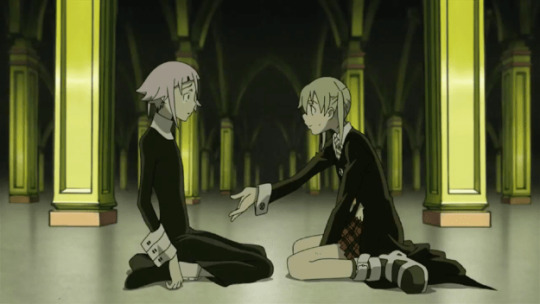
Crona does.
Whereas Soul serves as a stabilizing influence on Maka in her weaker moments, Crona makes Maka change on a fundamental level, by bringing forth all the aspects of herself that she has chosen to bury.
Crona brings out the kindness, the compassion, the ability to immediatly trust and love others withouth reservation that Maka lost before the series began during her family life breaking apart.
Crona makes Maka change to the person she wants to be, their relationship serving as the catalyst for her development into the young woman who did what Shinigami could not, and defeated Kishin Asura.
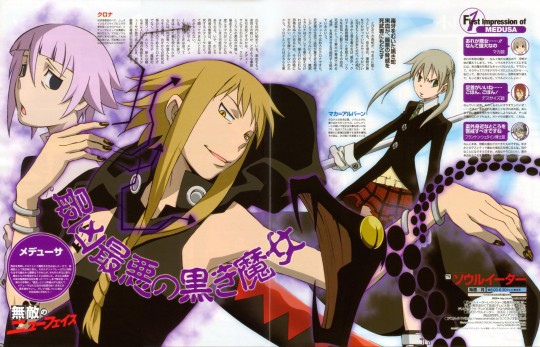
And of course Maka and Crona's relationahip had it's own drama as well, with her love for Crona putting her directly and personally at odds with Medusa, an enemy she disliked, but would go on to thouroughly despise and hate on a deep peraonal level due to how she treated Crona.
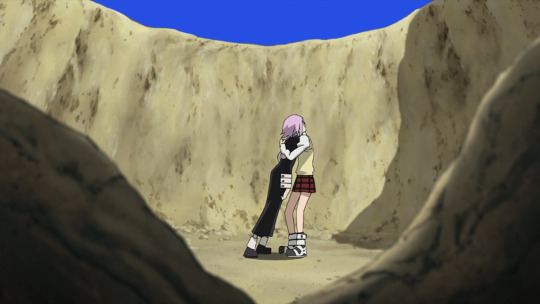
Of course, both manga and Anime goes different directions, but both are still the best character bits of their respective shows, with the sandpit scene, where Maka discovers she was betrayed, and feels the sting of just how much it hurts to be backstabbed by someone you love... While also finding it in herself to forgice Crona and help the friend she loves past this lowest moment.
It is here where she surpasses her parents, and in the long run, Asura.
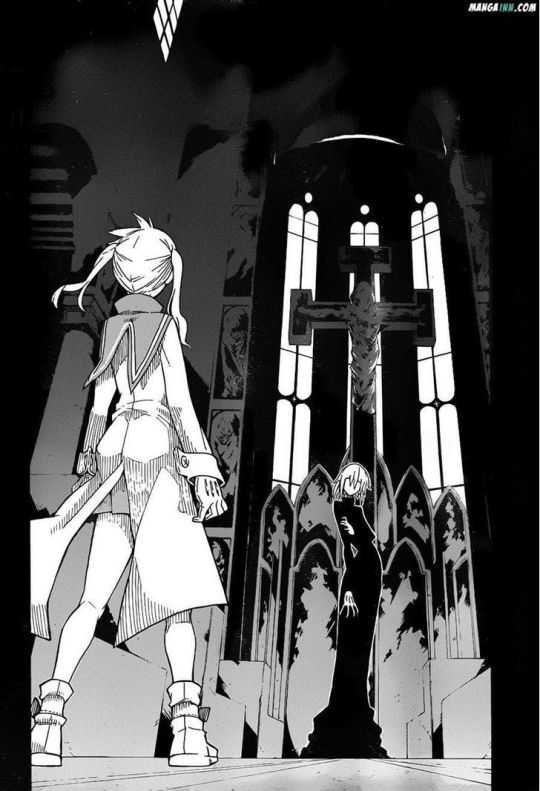
Meanwhile, in the Manga Crona becomes THE motivation and cause of Maka's life, and in the end, it is this relationahip that the climax was actually about. It was the most important dricing force that kept the rather disjointed and not well put together final arc, a coherent story around these two people who love each other... And it's the Manga's failure to bring this relationahip to a satisfactory ending, along with Asura not being defeated, that destroyed it as a story.
To bring it back around to the actual question, it is very telling, that in her final scene in the manga, where Soul makes it very clear that he is interested in her, she sorta turn downs his obvious flirting, to instead focus her feelings and dreams back towards Crona, because her love for Crona has not changed after the final battle. It is still the single most important thing in the world for her.
#soul eater anime#soul eater evans#soul eater#maka albarn#crona gorgon#meta#shipping#questions and answers#croma#soulmaka
25 notes
·
View notes
Text
Dragon Ball Super Manga Ch.100

Yes, Cheelai, we have finally reached the end of the 2023 Dragon Ball Apocrypha Liveblog, but in particular, we've also finally reached the end of the seemingly endless manga adaptation of the Dragon Ball Super: Super Hero movie.
And yeah, this seems like an anticlimactic place to close out the year, but that's kind of how this entire liveblog has been, when you get down to it. I've had fun going through all this stuff, but there's a reason I'm referring to it all as "apocryphal". The Tournament of Power is a lot of fun, and the two DBS feature films are instant classics, but none of it really feels essential to Dragon Ball. From the OAVs to GT to Super, the main theme here is "Hey, remember Dragon Ball? Let's make more of that!" Everything ends up being a sequel or a callback or an easter-eggy kind of deal. And that's not the worst thing that can happen to a franchise, but it's probably fitting that we're closing out on the final chapter of a comic book adaptation of a movie that serves as a sequel to the Android arc that was a continuation of the Red Ribbon Army arc.

Chapter 100 just retells the last several minutes of the Super Hero movie, and I already went over the film, so let's just concentrate on how the manga depicts it differently. We'll start with Gohan's right arm, which got some heat a few days ago when the previews came out.
I refuse to dogpile on Toyotaro, since he's a far better artist than I'll ever be, and I've genuinely enjoyed his art through this entire read-through, even when the writing has been bad. That said... yeah, Gohan's arm looks kind of weird. Maybe while Gohan was teaching himself the Special Beam Cannon, he learned how to do Piccolo's stretchy arm thing too.
I do think it's pretty dumb how chuds on Twitter will nitpick Toyotaro's art as though the original Dragon Ball manga was some kind of showcase of photorealistic anatomy. I've been a fan of this thing for a quarter-century now, and the key to loving Dragon Ball is to make peace with the fact that it's fundamentally goofy and stupid. Sometimes a guy's arm gets drawn longer than his other arm. Sometimes characters scream so loud that their jaws unhinge like when a snake swallows an egg whole. Bulma wasted a wish on the Dragon Balls to make her ass look hotter, because if she didn't, then Frieza would come back and use the wish to make himself taller. Goku grew his tail back by having a guy tug on his ass with a pair of pliers. This show was always a hot mess, so don't blame Toyotaro. It was like this when he got here.
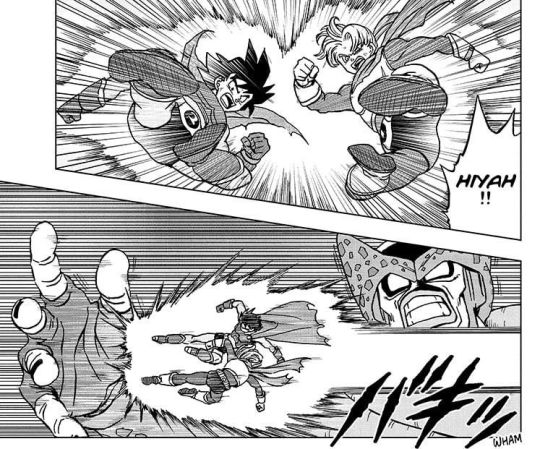
Anyway, Cell Max tries to block the Special Beam Cannon like he did in the movie, but Gohan has a harder time punching through, so in this version Goten and Trunks jump in to distract Cell and give Gohan a boost. In the movie, they were still Gotenks until after the fight ended, but in this version the battle must have taken a little longer, since they de-fused a little earlier.
Of course, this is just a way for Toyotaro to show off the Great Saiyaman X-1 and X-2 costumes one more time. It's kind of pointless, because all of the added Goten and Trunks scenes in this arc have been pointless. Also, Trunks' pose looks really awkward here. He looks like he got sawed in half, and both halves are still kind of flying forward in the same direction, but he's no longer connected.
I will say that I'm grateful for this final appearance of X-1 and X-2, because it gives me a chance to critique their outfits one last time. I hate the superhero undies they wear over their tights. They look baggy and puffy for some reason, which make it look like Goten and Trunks are wearing diapers. I'm pretty sure that's the exact opposite of what the boys were going for.
I mean, the outfits aren't that bad, but what irritates me is how Toyotaro keeps showing them off like this is the coolest thing going on in this story. The designs are presented like they somehow connect all these different things. Goten and Trunks were inspired by Cleangod, and they named their personas after Great Siayaman, and then Dr. Hedo saw them and supposedly based the Gammas' costumes off their look. Except X-1 and X-2 don't actually look anything like Great Saiyaman, or Cleangod, or the Gammas. It's just frustrating.

Anyway, we get the same bit about cosmetic skin alteration from the movie, except Gotenks has already separated in this version, so Bulma can address Goten and Trunks separately.

I also like this part after Pan shows off her flying ability. This segued into the credits of the movie, but here we see Gohan calling out for her to stay closer to the ground. It's pretty cute, since it kind of calls back to when Gohan was a timid child way back in the early days of DBZ. Now he's older and braver, but I bet when he sees Pan up so high in the air he thinks about how scared he was whenever he was up really high.

Meanwhile, some Red Ribbon goons have survived the battle and appear to be slowly getting away. This is nice because I noticed these guys escorting Carmine to safety in one of the previous chapters, and I've always wondered if any of the Red Ribbon guys made it out of the base alive. Pan knocked Carmine out, so it seemed reasonable to assume that he was vaporized during the Cell Max battle. Actually, in the movie, it looked like the entire crater was flattened, but here it looks like the destruction stayed confined to that area.
Anyway, the implication is that Carmine will return to Red Pharmaceutical and try to figure out his next move, but it seems unlikely that he could be much of a threat. Magenta's dead, the base is destroyed, and a bunch of their soldiers either died or deserted in this battle. Remember, even with the base and all those soldiers, Magenta still wasn't ready to make a big move. Dr. Hedo's androids were supposed to be his game-changing weapon, and now Hedo's turned against the Red Ribbon, so what can Carmine possibly do from here?
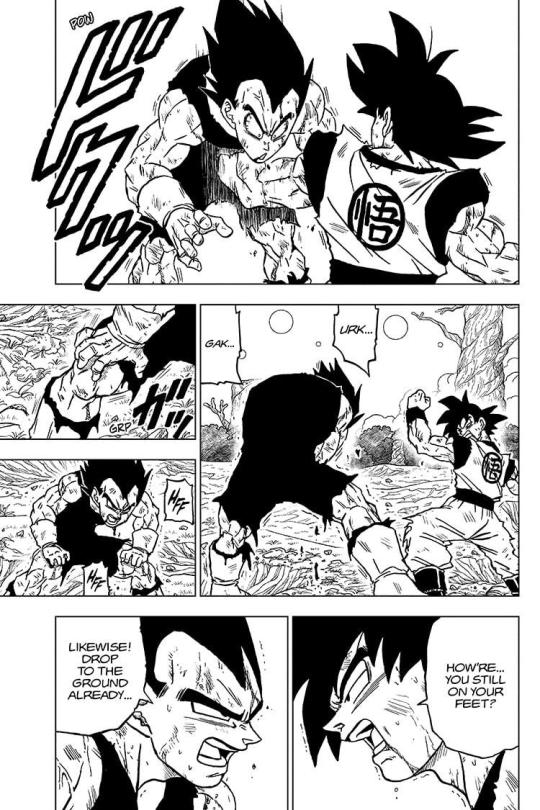
We get some additional material of the Goku/Vegeta fight in the movie. In the post-credits scene, they were practically moving in slow-motion and we only got to see the final blow. Here, we see Goku and Vegeta each land one last punch before the one that ends it all. These boys look all rowdy and badass and it's great.
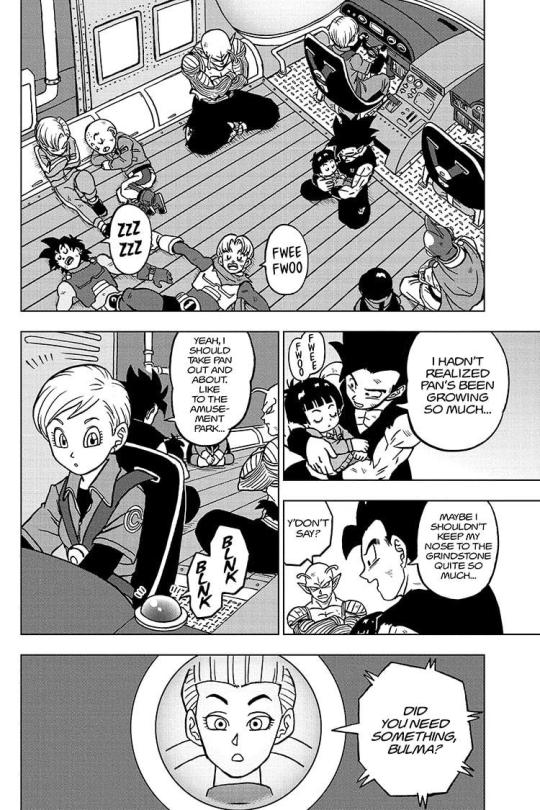
When Whis finally responds to Bulma's messages, we get this cute shot of everyone sleeping in the back of her aircraft. Gohan talks about taking her to the amusement park, which seems kind of random, but it occurred to me that this might be setting up some filler story for Chapter 101. Like Gohan and Pan go to the amusement park for the day, and Carmine tries to kill them or something to avenge the Red Ribbon Army. That probably wouldn't be a bad idea, although I really don't want that to happen, because it sounds similar to the "Hedo vs. Goten and Trunks" stuff we had in Chapters 88-90. Everyone thinks Toyotaro has been champing at the bit to get done with this arc so he can return to his Black Frieza business, but for all we know he's been enjoying this whole bit, and he'll blow the next six months on filler stories with Goten and Trunks goofing around with Sgt. Nutz.

Anyway, this is the last page and this was the last little bit of the movie too, so Toyotaro has definitely run out of movie to adapt. Also, Bulma looks really cute on this page, so I wanted to add that to the record.
So that pretty much wraps things up, except for one minor detail. Where's the big twist?

I ran across this last month when I was checking to see if Chapter 99 would wrap up the arc or not. CBR.com did an article entitled "Dragon Ball Super Chapter 100's 'Unbelievable' Twist to Lead to "'Crazy Developments'" The story stems from comments made by V-Jump editor Victory Uchida, who was hyping DBS chapters 99 and 100 while appearing in an unboxing video for some reason.
The video is in Japanese, so I can't just pull out direct quotes from the man, so maybe this was all some big misunderstanding. Maybe it was a mistranslation, maybe Uchida got confused and was referring to material that wouldn't see print until Chapter 101. Or maybe he was just doing a standard hype job for his publication without thinking about what was actually in the magazine. After all, how can Chapter 100 have an "unbelievable twist" when it's doing a shot-for-shot repeat of a year-old movie?
So I assumed this meant there would be some sort of epilogue scene in the final pages, designed to set up the next arc. Sort of like how the last chapter of the Tournament of Power arc had the scene where the Galactic Patrol kidnaps Majin Buu. But Chapter 100 had no such thing. No Black Frieza, no Cell Max suddenly turning the tables on Gohan to win the movie, no mysterious appearance from Purple Turles or Red Bojack. Not even a lousy cameo from Platinum Cooler.
Does this make Victory Uchida an unreliable source of information? Or has he simply been misunderstood? I feel like his ridiculous yellow wig/hat thing kind of holds the answer to that question.

Anyway, the ultimate fate of Dragon Ball Super lies in Chapter 101 and beyond, but those stories will be printed in 2024, which means they fall outside the scope of this liveblog. So unless Toei or Shueisha has a new movie or anime coming out in the next eleven days, I'm done. This has been the 2023 Dragon Ball Apocrypha Liveblog. Good night, everybody!
#dragon ball#dragon ball super manga#2023dbapocryphaliveblog#cell max#gohan#piccolo#bulma#krillin#goten#trunks#whis#android 18#victory uchida#pan#son pan#goku#vegeta#dr hedo#gamma 1#cheelai
21 notes
·
View notes
Text
I do feel I’m finally able to put a finger on why I don’t care for the Egwene of the Sanderson books. His take on her is heavily reliant on the assumption that her primary goal and motivation in rallying support to her cause is to attain power and maintain it, rather than the process being a step along the way to achieve her main objective, a cause that she dedicates herself to wholly: to unite the white tower and prepare the world for the last battle. The Egwene of the last three books is more preoccupied with trying to eliminate opposition of any sort to her opinions (whereas RJ trains her to mediate between different factions since they’re the marks of a good administrator) and isolates herself from her allies in the process of trying to assert her individuality (which RJ explicitly warns about the dangers of with Rand’s arc) but this is a general pattern also with regards to all the ta’veren shrugging off their mentors in the last three books. She’s obsessed about being in control and ensuring that her opinions are given weight because of the position she holds rather than the merit they might carry, and believes that her being in a position of power will automatically ensure that the problems at hand will be solved* - this is in direct contrast to RJ’s framing of her stepping up to the task of being the Amyrlin as a last resort and taking advantage of the opportunity afforded to her to do her best to work towards the larger goal of defeating the dark one with Siuan’s guidance. The Egwene of RJ’s book prioritises her goals before the self; the Egwene of the Sanderson books prioritises her ego before her goals. While elaborate speeches are inserted about how passionate she is about the tower being reunited once more, her characterisation and actions directly contradict her words.
The framing of the entire Gawyn/Egwene conflict in towers of midnight with Egwene being derided by the narrative for not submitting to Gawyn’s opinions and her being constantly undermined by the three ta’veren whenever she sets herself in opposition to them (particularly during the dragon’s peace conversation & rand’s visit to the tower) also indicates a fundamental dislike for the character as a whole - besides corroborating the pattern of the last three books conveying generally very distasteful takes about women & the female characters of wheel of time, tbh.
Along the same lines, a lot of these issues with her characterisation are also applicable to Rand, which is why the framing of the narrative around him - that the peoples of the continent are required to follow him merely because he’s no longer (supposedly) mentally ill post-dragonmount and fully steps into the role of the “saviour”, a figure that RJ critiques thoroughly - sits very wrong with me, besides annoying me for very obviously deviating from RJ’s own worldbuilding lore.
*with the caveat that Sanderson believes that as long as the right individuals are in power, any power structure, however flawed, abusive or harmful in it’s founding ideology, is capable of good - and this is reflected in the treatment of the Seanchan and the Whitecloaks.
#her punishing her own allies too at the end of book 12... no.#I can't tolerate the gawyn/egwene arc in towers of midnight. it's so rancid.#gawyn suggesting making warder-bonding mandatory is the second most rancid thing to come out of the 13th book#I'm done it's out of my system#except that rand post. which I Will finish someday.#text#brandon#egwene al'vere#wheel of time#wot book spoilers
65 notes
·
View notes
Text
the recent chapters r really making me like olivia like damn. at first she's just kinda this pitiful person to be saved from her awful situation, yeah? but the story still says, "her survival is super important, actually" and it doesn't rlly click. cuz after she's free olivia turns into a bit of a stock character.
she's then just always kinda flirty and irresponsible and clingy. and that makes sense to me, cuz her upbringing was super strict and repressive, so she wants to sever all ties with that and is acting in the opposite way than she was raised. priests of her religion aren't allowed to marry so she starts flirting with reinhardt not because she's romantically interested in him but because she enjoys the promiscuity and he's the one who helped her most so he's easiest to talk to like this. this also shows especially in how she reacts to compliments back; she becomes easily flustered because the flirting is just a face she puts on for fun and beneath that she's still deeply inexperienced with such things.
the sponsorship event chapters really hammer home that she's a kind person truly deserving the title of saint. she's been raised to do good and be kind that she doesn't know how to live for herself at all.
add to that the gradual collapse of her religious beliefs. obviously she cuts ties with the knights templar cuz they tried to kill her and her own stepdad lead the charge to do so, resulting in a distrust toward the gods, because what kind god would have followers like this? but she at least still believes the gods exist. But then the tiamata arc happens and she discovers that even the gods themselves are a falsehood. the gods of purity and corruption are the same being in two directions; so if your own faith decides the nature of your god, does said god exist at all? if your will shapes god's will, does god have a will at all? she's basically discovered this setting's version of atheism.
tlde she's just plain lost. And yeah the novel is always blatant abt feeding you character details like this but i still think it's set up well.
all her eccentric behaviours are attempts to find herself but nothing sticks. she has no more dreams, no ambitions, just drifting with the flow. she just doesn't know how to have ambitions not dictated to her, how to do anything besides following orders.
and again like. the story says "her survival is going to change things" and we learn its bcuz olivia is an insane fucking powerhouse who can outclass ellen. and with her being the way she is now, any faction could snap her up. she'd just go with the first one that suited her fancy. as long as its not the knights templar, she'll be fine with anything.
which i think reflects a lot of people with impending graduation on the horizon? i sure know when i finished high school i didnt know what to do. i'm happy with my career path atm but i also feel like i could've been happy doing anything else. i just stumbled into it. olivia reflects that feeling of not knowing who you want to be, with all these external pressures, religion, family, peers, that have all these expectations for her.
also how the story then immediatly contrasts this against reinhardt. he's presented as like, a pretty selfish, self-assured character. he knows who he is and what he wants. but olivia asks him, "do you?" and challenges him to reevalute. cuz is he selfish? he's just acting that way, when he's actually concerned with the well-being of others above all, same as olivia. the only thoughts he'll spare for himself are for his own survival.
and like, again!! olivia was putting on a selfish seeming face when she's fundamentally still just kind beneath it all and both of them don't know how to be any other way!!
hell, even the circumstances are similar! olivia ditched the knights templar to save her own life but doesnt know what to do with the life she saved, and reinhardt escaped the demon king's castle to save his own skin. the main difference here is reinhardt is still working toward averting the crisis he's written into prophecy. he's still essentially trapped in the beginning of olivia's arc. so comparing the two is asking what will he do when the world's saved?
Chapter 244 i am kissing you on the mouth.

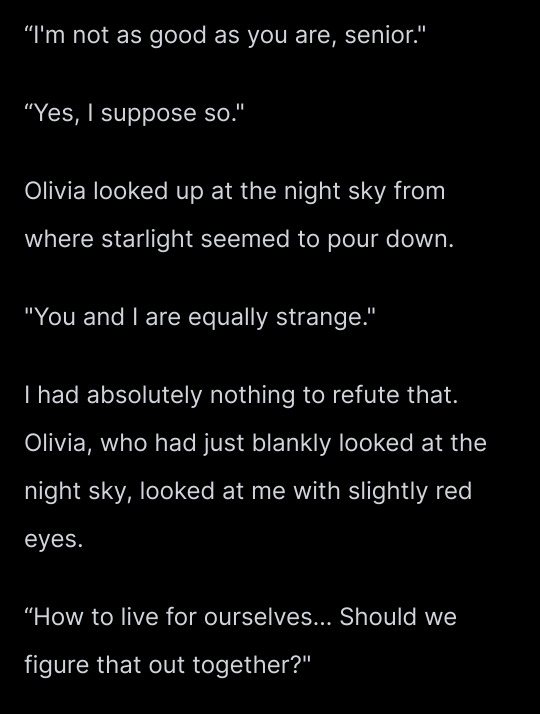
#feli speaks#the demon prince goes to the academy#long post#RAMBLE TIME.#also sidenote another epic win for the aro reinhardt agenda because this all deconstructs the seeming attraction olivia had for reinhardt#which was fucking WEIRD because she's 22 and he is (seemingly) 16#but doing it like this takes away the One Aspect i disliked abt her so now i love her actually. you go olivia.#please learn some self-respect girl. i know you can do it#also another sidenote. god bless that one post that shows how to make readmores on mobile#otherwise yall would be dead five times over#dont have anyone to be autistic abt this series with so tumblr will have to do!!!
2 notes
·
View notes
Text
Another absolute banger from the best writing channel on youtube. Just 8 minutes in I already had a clearer understanding of the fic I'm trying to make progress on. Ellen Brock has such a good understanding of how stories function and is just incredible at explaining it.
I've summarised the video in writing below the cut, but I urge you to watch the actual video for more nuanced explanations with very clear examples, it's great! The video itself also has a summary starting at about 39:20.
youtube
Summary:
The character arc is made of 4 components:
Motivation: the character's deepest desire. Most often subconscious and implicit rather than stated. A feeling they strive to experience, but don't (eg. to love, to be loved, to belong, to have power, justice, acceptance, etc). Not inherently good or bad. Ideally very specific, pinned down to one or two words. The primal drive that stays the same within the character, even as their goal might shift (then the motivation is probably the thing that causes their goal to shift).
Goal: the external thing the character wants to achieve; a clear symbol of success. It's simple and superficial, and readily apparent to the audience. This is how the character believes they'll achieve their motivation; what they think will get them that feeling that they're craving. It gives the story and character's actions a direction and purpose. Often pivots or changes over the course of the story, as new events and experiences interact with the character's motivation and their beliefs and goals adjust in reaction to the resulting discoveries.
Sidenote: a character may identify more with either their motivation or their goal. Bear in mind that a goal-oriented character is more focused on actions than introspection, even in their thoughts, while a motivation-focused character may be more conciously reflective of their motivation. Most people are more conciously aware of their goals than their motivations, so an overly self-aware internal monologue often feels unnatural.
Belief: a specific idea the character has about themself, the world, or other people. Most commonly starts out being negative, but not always (see arcs below). The origin of the belief may be presented to the audience, as a backstory or flashback, in dialogue or as a scene, and can be either a specific event or a general environment. The belief should cause conflict and problems for the character, for example by making the character pursue the wrong goal, or by causing them to pursue the right goal but in the wrong way. Even a seemingly positive belief will cause conflict and problems if it exists in an environment that opposes it.
Lesson: the "point" of the character arc, which provides contrast to the other parts. Not necessarily the absolute diametrical opposite of the belief, but should contradict it (eg. people are fundamentally good or bad vs. people are complex and capable of change). The lesson can be either positive or negative, depending on the belief (see arcs below). Should be felt in the story even before it is conciously introduced to the audience, for example manifesting as a crack in the facade, or envy or jealousy, or some other way of planting a seed that hints at a potential alternative to the belief. Likewise, a refusal from the character to accept the lesson (whether temporarily or permanently) should also make itself felt to them, either through negative consequences or through the absence of positive ones (illustrated by showing other characters reaping the benefits of accepting the lesson). Another character will commonly articulate the lesson explicitly at some point within the story, but won't do so repeatedly.
These then come together in one of these 4 ways (the same arc can be perceived differently by different people, because positive and negative are subjective terms):
Positive arc: a character with a negative belief encounters a positive lesson. They accept the lesson, ending with a more positive belief.
Negative arc: a character with a positive belief encounters a negative lesson. They accept the lesson, ending with a more negative belief.
Light flat arc: a character with a posotive belief encounters a negative lesson. They refuse to accept the lesson, ending with a positive belief.
Dark flat arc: a character with a negative belief encounters a positive lesson. They refuse to accept the lesson, ending with a negative belief.
Sidenote: note that the lesson is still present in the flat arcs; the character might even try it on for size over the course of the story. The difference to the change arcs is that in the end, they refuse to accept it.
Tips:
Write down the parts of this you already know. This helps you focus on what matters, and narrows down the options available for the other ones, making it easier to pick them out.
Interrogate what you know to figure out the what you don't know (made easier by the above tip). As questions that expand out from those known parts (Why...? How...? etc).
Knowing what type of arc you're going for can guide you while trying to figure out the specifics.
1 note
·
View note
Text
Fushiguro Megumi: the protector
One of the things that makes jjk very interesting is how Gege writes the characters in a way that freed them from a number of stereotypes usually found in shonen manga in relation to how their appearance are. And that makes the character in this manga feels more layered. One of the example is our deuteragonist himself, Fushiguro Megumi.
Fushiguro is one of characters that make you thought of certain stereotype - but as the story progresses and his character is explored more, he is actually different from the stereotype of dark brooding rival of the protagonist his appearance is based of.

On his first appearance, Fushiguro is shown to be someone serious, seemingly a stickler for rules and formality, as he speaks in honorifics to Gojo in the phone -- even if it’s him saying that he will punch Gojo. When he speaks to Gojo, there’s a strange mix of formality and familiarity, which is a given considering their long history.

He even cites the law of jujutsu for the reasoning of Itadori’s execution right after Sukuna incarnates even though Itadori eats the finger because he is also trying to save Fushiguro. However once Gojo appears and asks what he should do to Itadori, his answer is right on the opposite direction.
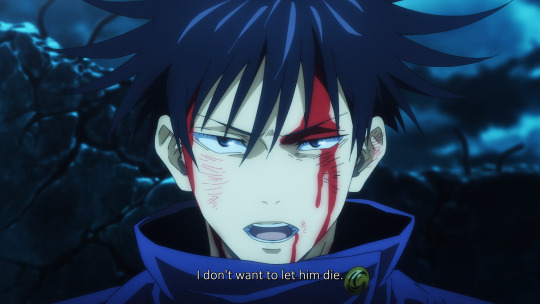
And from this point on, we know that he is never ‘just a simple rival’.
1. Not even a rival
Itadori and Fushiguro’s dynamic is one of the focal point that drives the story of jjk, among others.
but who’s to say that someone you save won’t kill anyone in the future?
Fushiguro and Itadori share the same fixation on saving people. While Itadori wants to give “proper death”, or save as many people as he can from curses, Fushiguro rather listens to his own conscience, where he want to give good people what they deserve. And this believe of his rooted from the ‘undeserving’ situation he feels is granted to his sister in this life. This different ideals made the two of them clash during Cursed womb arc, but they settles their difference pretty quickly out of respect for each other, and this connects the two of them closer than them to other characters.
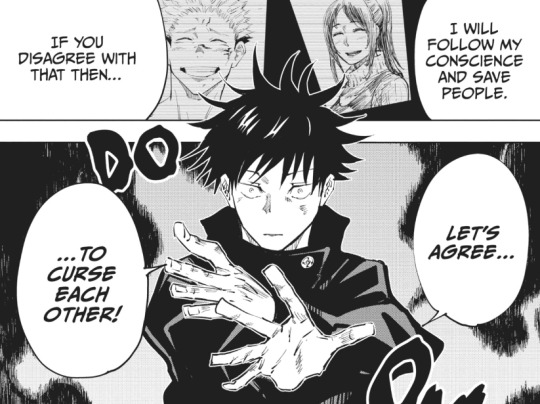
For Fushiguro, Itadori has become someone as important as Tsumiki despite only knowing him for a short time - and likewise, Itadori also thought Fushiguro as important. Fushiguro, in addition, also feels that he bears the responsibility of keeping Itadori alive and shoulders the consequence of every action Itadori and Sukuna does, since Itadori consumed Sukuna to help him in the first place. That is the reason his first fight with Sukuna happens after all; him staying behind out of feeling responsible.

And this responsibility develop into the necessity to protect Itadori, both from literal harm (the Kyoto students trying to assassinate him) and from metaphorical one. Likewise, Itadori not telling Fushiguro what Sukuna told him is also to protect Fushiguro from the guilt that will consequently arise.
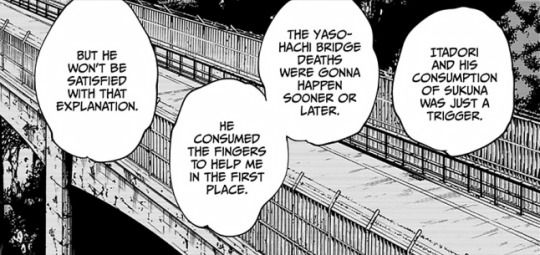

While there is a bit of rivalry, it doesn’t become something that the two of them fixated on. It does feed on their growth, but this rivalry mostly takes a backseat - it will, when he lives in a world where everything, even the authority, is trying to kill his closest friend and someone he is trying hard to protect.
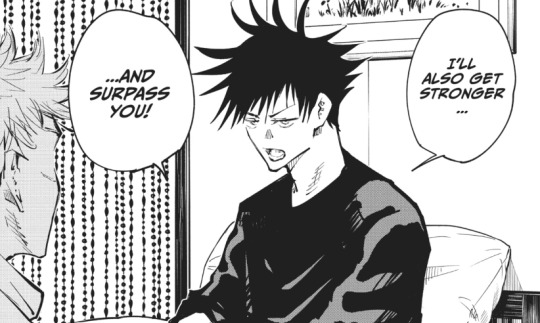
2. To die or not to die
Fushiguro’s nature as a protector is rooted in his personality. Because of his upbringing and precociousness, he has his own view of what he think to be ‘good’ and ‘bad' that is very personal to him.
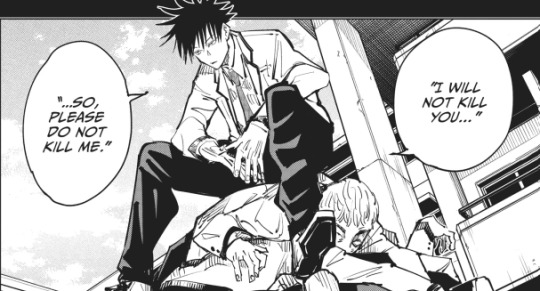


Fushiguro has certain degree ‘sense of justice’ based on his notion. During this flashback, he picks fight with the delinquents not because they attacks him personally and not because anyone asks him for help, but just because he thought that they are wrong in bullying their classmates.
At first he is not inclined to be a jujutsushi because saving people doesn’t fit into that notion of his. The work of a jujutsushi is in its heart is to save people and it’s tailored for not only the one who has the ability, but also the compassion to do it. Something that is unthinkable for junior high Fushiguro.


It’s Tsumiki’s curse that change Fushiguro. He is started to driven to save people like Tsumiki. And also, if there is someone that can solve the case of Tsumiki’s curse, it will be a jujutsushi.
He feels that a lot of people he thought to be ‘good’ given unfairness in life. Like his sister who was cursed and fallen into coma, and Itadori who ate Sukuna then received death penalty.

I will save people unequally!
His personal sense of justice drives Megumi to help and save them in his own brand of heroism stemmed from his ego of choosing who’ll he save and who won’t. ‘Good people’ affects Fushiguro deeply that out of respect for Itadori who had died, he does something that usually he doesn’t do.

While he sees both his sister and Itadori to be the same good kind, he judges himself to be different from them and he doesn’t care if he is ‘not right’. He doesn’t feel that he deserves the salvation as deserved by ‘good people’ and this reflects mainly in his... um... suicidal, sacrificial tendency.
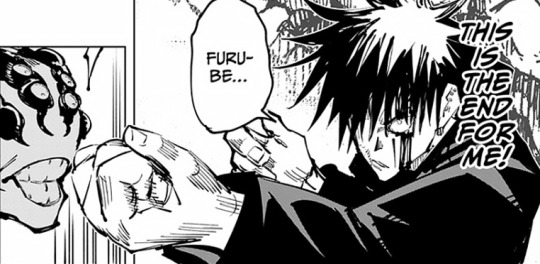
Every single time he is cornered in battle, he used to resort to summoning Makora - which essentially means he will die. He doesn’t think that his death is matter at all for anyone else as long as his purpose in winning the fight is fulfilled - which actually not necessarily true.

It’s a good thing that after his training with Gojo, Megumi starts to realize the importance of him not resorting to ‘winning by dying’. This point in Shibuya actually marks a significant development of his character - even if he still summon Makora after.

3. Blood does not necessarily run thicker
One of the most surprising aspect of Fushiguro is how he readily discarded the identity that comes with his bloodline. A contrast from Kamo and a point that makes their clash during Goodwill event arc very interesting. For Kamo whose mother left him so she doesn’t get in his way to be the family heir, the way Fushiguro easily deny his bloodline of course offends him highly -- it’s almost like Fushiguro does not care about his mother’s sacrifice.
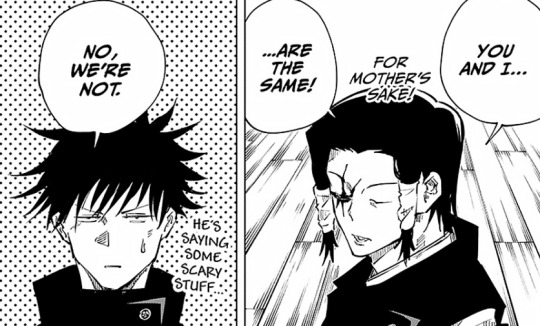
Well, it is understandable that he deny his bloodline. Regardless that the tradition of the Three Great Families just reek of shit, Fushiguro never experiences normal blood-related family bond since he was born. Everyone who should be his family based on blood never give him the bond other people experience. His biological mother had died, his father left him (and died unknowingly), Tsumiki’s mother also left the siblings. The one who took care of him was Tsumiki and Gojo to an extent, both of whom has no blood relation to him. Gojo even bought him from the Zen’in. And the Zen’in who is supposed to be his blood-related family trade him off easily with money, so it is understandable if he does not feel a strong bond with his own bloodline.
This is ironically (but in a positive way) very contrast with Fushiguro’s technique; Ten shadows jutsu. One of Zen’in’s most prized inherited technique is manifested by Fushiguro who deny his blood and passed down by his father who the family refused to acknowledge as one of their own. The technique that also made Fushiguro coveted by the head family that they readily forked over 10 million for him. It’s a very ridiculous situation.

4. Next ‘strongest sorcerer’
The growth of a jujutsushi is never easy.
Fushiguro’s growth as a jujutsushi is a difficult matter, way more than Yuuji. Compared to Fushiguro who is already familiar with jujutsu from a very young age, Yuuji is like a child whose growth is still in exponential phase. Since his main weapon is his cursed technique, Fushiguro’s growth as the more settled jujutsushi in this case should mainly come from inside himself. But it’s been a rocky way for him.

First, his mindset is working against his growth -- because he has Makora to rely on, he tends to summon it readily than try to explore his technique more. Then as fundamentally Fushiguro is someone compassionate, he puts cooperating and matching his level to people around him first -- which actually hindered his growth of ability, because his nature as jujutsushi is on the opposite side.

As a jujutsushi, Fushiguro’s nature is the same as Gojo and Sukuna; a lone wolf who is the strongest on combat when he is alone. Gojo even implied once that Megumi’s cursed technique has the potential to be on par -- even beat his.

With not one, but two strongest jujutsu users invested in Fushiguro’s growth, I think it’s not an overstatement to say that he will be an incredible jujutsushi in the future -- if his growth does not fail him. And going by the current story development, it is more required out of Megumi to be stronger than ever, both as the person that he is and as jujutsushi.
5. The future is as uncertain as ever
Now that Gojo is gone, the burden Megumi shoulders will be exponentially rising. More than to stabilize Tokyo back, it is the responsibility that he always feel over of keeping Yuuji as Sukuna’s vessel alive that probably will demand a lot out of Megumi. In addition to losing Gojo and the waking of Tsumiki as one of the Brain’s victims, Megumi needs all the strength he can muster, literally and figuratively, to be able to survive the coming of near future -- even though ironically he is one that is readily dying anytime.

696 notes
·
View notes
Note
Hello, I love your prompts. Absolute gold.
Could you please pretty please, help me with some friends-to-lovers-to-enemies prompts?
Thank you so much, anon! This makes my day ♡ I tried my best with these prompts. I hope they'll do the job :)

10 friends-to-lovers-to-enemies prompts
Feel free to use and reblog!
Settings/Situations:
#1 - High school friends - They had been in the same group of friends in school and only gotten closer when everyone went their own way after graduation. It seemed they had more in common than they'd thought over the last years. They're spiralling ever closer as their paths to the future throw them together and it's inevitable that a blazing romance ensues. After years of friendship and a zooming love affair, however, they have missed a crucial point. How could they have overlooked this major divergence in certain values/morals they apparently didn't share?
#2 - Rocket start - They have a booming relationship. Their history has always been one of triumph and success. With every year, every step they took, they grew closer, from friends to best friends to lovers to THE couple. Never have they experienced real setbacks or defeats. And this proofs to be their damnation. The high and always increasing expectations they have in their relationship and each other break them.
#3 - Collision of different lives - They met by chance. Their lives have no great overlaps. But the few coincidental encounters introduce a friendship and after some months it is as if they have always known each other. A relationship develops and they become a couple. Their lives are still very separate apart from their relationship; no mutual social group, no mutual workspace. But then there is this offer, and both of them are interested. Suddenly they are rivals with the same ultimate goal that they both try to reach on their own.
#4 - Bosom buddies - They are inseparable. Fighting for the same cause, standing on the same side. Their minds seem to work similarly, and their souls find each other in love. First, it looked as if they were bosom buddies. But when a fundamental conflict arises within their team/party/movement they cannot find back on the same page. The split of their team results in them leading the new different parties and breaking with each other on all(?) levels.
#5 - Mission of destruction - As close friends, they had spent years and years on end being there for each other and nursing a growing affection. When they finally confess their feelings and become a thing it is long overdue. And then, they are set up to bring down the other's company/team. At first, they were convinced that this wouldn't change anything. Just because they had these missions didn't mean they would fight each other. But as there is no chance for them to back out they have to fight this mission to the bitter end.
Dialogue:
#6 - "I never thought our case could be so hopeless."
#7 - "How could this have happened? This wasn't supposed to happen to us. We were meant to never break."
#8 - "What's the point of trying to keep going when we are heading in opposite directions?"
#9 - "But somehow what I miss isn't you anymore. It's what we had. It's us. And this is merely a construct now."
#10 - "I'm sorry. But I am afraid it's too late for that. There were times when I'd accepted any sign from you as atonement but you have missed that. We've failed."
key aspects to focus on when writing friends-to-lovers-to-enemies:
The success of friends-to-lovers-to-enemies is closely linked to the plausibility and authenticity of the trust-breaking event.
to break the deep trust that has built up between friends-to-lovers-characters, there has to be a major dividing event
if the final state of hostility isn't only on a superficial level but roots deep, every former connecting bond has to be made irrelevant in some way
friends-to-lovers-to-enemies is based on a relationship arc that increases in closeness and trust between the characters for a long time so that it reaches a very high level, until (all of the sudden) it drops dramatically
think about: What could cause such a severe break between your characters? What holds them together ultimately resp. the elimination of which component of their relationship could mean the end? ➜ this element can be very individual depending on your characters
#writing prompts#writing ideas#writing inspiration#writeblr#prompt list#angst prompts#otp prompts#10 prompts#friends to lovers to enemies#friends to lovers to enemies prompts#quarrel prompts#dialogue prompts#setting prompts
147 notes
·
View notes
Text
Rory dropping out of Yale; my thoughts
So I grew up in an Asian household (think Lane's family but with a mother-daughter relationship similar to Lorelai and Rory) where it was instilled in me from a very young age that a) handouts are for the weak and we should work for every single opportunity available b) do not waste the opportunities you get even a little bit. My parents took these fundamentals to the extreme sometimes, leading to Paris levels of insanity (more so because they're both academics), whereas I quickly realised that taking the easy path isn't necessarily a BAD thing. That being said, I was still very very shocked when Rory dropped out of Yale. I watched Gilmore Girls with my mom and the difference in thought really shined through when she just couldn't accept Jess not graduating (whereas I understood perfectly) but then there were also similarities in the way that we were both horrified when Rory accepted the internship from Mitchum. In fact, my mom very nicely told me that if I ever drop out of college like that she will hound me day and night until I go back.
So why is this important exactly? This school of thought that me and my family have, that rejects any sense of privilege (mostly because we don't have any) is very similar to Lorelai's (though she could pick and choose when she wanted to renounce her privilege) and this is by extension what Stars Hollow and Lane and Jess represented to Rory. On the other hand there's the world that we know nothing about; Emily, Richard, Logan, the DAR, these were the things that Rory discovered when she dropped out of Yale and essentially rejected her mother’s path for her. I hated this storyline, not because it was bad, but because it was so exceedingly well written that it made me very uncomfortable. Here is this girl, very similar to me as in she's a gifted child who is just tired of schooling and needs a break. But unlike me, she has the privilege to completely give up on the dreams she was working towards just because it was hard.
Unlike Lorelai, Rory liked her grandparents' world, even in the earlier seasons (the debutante ball for example). She was just never given the chance to fully embrace it because at that point she was still under her mother's control. So it's no surprise that when the dreams and life she had carved out for herself with the help of her mother failed (Mitchum telling her she didn't have "it" to be a journalist) she ran in the opposite direction from that life. The situation is a layered and complex one, and I truly believe if Richard and Emily had let Lorelai handle it then Rory would've been back at Yale sooner, if not immediately. Maybe she would've worked a little or looked at other courses but if she was with her mother instead then she wouldn’t have lost her sense of self so completely. But... Rory needed to lose her sense of self at that point, mostly because it was so tied with Lorelai and her dependence on her, so to become her own person she had to make some really bad decisions. She also needed to be fully immersed in the privileged lifestyle to realise that she didn't want that either.
Unfortunately this drastic and sudden shift in support systems left Rory reeling and as a consequence left her even more confused and floating than she had been right after she got “feedback” from Mitchum and stole the yacht. Which is why we see her struggling with her daily routine, she tries to accept what the luxurious lifestyle entails (partying with Logan for example) but simultaneously looks for echoes of a previous life (throwing herself into organisation and planning for the DAR).
I don't know if this is a popular opinion or not, but according to me Rory didn't go back to Yale because of Jess. By the time he came into the picture she was already 90% there, she was tiring of the easy, aimless path and wanted the challenge of having a dream again. She just needed one last push. I do think it was important that it was Jess who was the one who gave that push, for a couple of reasons; a) full fucking circle, she helped him at his rock bottom and he made something of himself thus making her come to the uncomfortable realisation that the roles have changed b) no one else was around to do it, Lorelai had given up on her, Logan was useless and Paris wasn't intuitive enough to know that she needed it. And honestly, if Richard or even Logan tried, they wouldn't have been successful because to Rory they very clearly represented the easy path and she wouldn’t have listened to them and lastly, c) Jess and Lorelai had the exact same character arcs, which is why he's the only one other than her mother who would've gotten through to Rory. Jess says and represents the same things Lorelai does, but because of timing (the ONE time their timing was good) and their relationship being different from Rory and Lorelai, what he said is exactly what she needed to hear at that moment.
Rory's burnout of epic proportions was a long time coming, she had a difficult time in Chilton, an even harder time in Yale and it didn't help that her personal life was almost always in shambles. The reason this burnout derailed her as much as it did was because of the play of privilege. If Rory didn't have her grandparents to fall back on, she would've done what the rest of us did; suck it up or find a different career path. But she did have them, and while the route her character arc takes is unrelatable to me, it stays true to the storyline and the situation that Rory is in.
#gilmore girls#rory gilmore#lorelai gilmore#emily gilmore#richard gilmore#gilmore girls meta#jess mariano#character meta#notice how i don't mention paris much#it's because she doesn’t represent either world#but accepts that rory needs time to find herself
83 notes
·
View notes
Note
Graphite, comrade, What is StarCraft? Is Ranboo Star? What does Technoblade do, is he Craft? Inform
[the warehouse doors slam shut and lock]
StarCraft is a video game franchise with the first installment, simply entitled "StarCraft," releasing in 1998 and the last major story installment, StarCraft II: Legacy of the Void, releasing in 2015. It is a real-time strategy game with the fundamental gameplay being establish base, collect resources, manage economy, make army, crush the opposition, and although the campaign missions can vary (several are basically crawlers, some are holdouts, etc) they have the same real-time and micro aspects as a standard game
The plot of the game is that a bunch of human exiles (Terrans, so called because they are from earth, or used to be initially) end up in the Koprulu sector of space and something is spreading in the fringe colonies and then suddenly this fleet shows up on these colonies and glasses the planet. It ends up turning out that the Terrans have stumbled upon a centuries-old interstellar war between the Zerg, a hiveminds (sci-fi "hivemind") insectoid species with the driving force of consuming and assimilating all life (especially the Protoss) into the Swarm to reach their final form, and the Protoss, a highly technologically advanced theocracy of psychic mouthless aliens who are in large part ALSO a hivemind but they don't call it that because "the Khala is the sacred unity of the Protoss" or whatever (and they have UNENDING social conflict going on)
Honestly I'm considering making Techno a Protoss agitator actually on second thought because the Protoss lore has a LONG procession of guys who say WAIT A SECOND THE GOVERNMENT IS BAD and then die (Adun. Tassadar. Raszagal. Zeratul) but currently I have him as a Terran military leader (bc the Terrans ALSO have a long history of political strife and activism including the protagonist Jim Raynor who is a direct action king) who defected and then who also got infested; the Zerg cannot infest Protoss bc their DNA is currently incompatible or whatever but they CAN infest Terrans which usually turns them into drones for the Swarm but there have been a couple (and I do mean a couple) of notable exceptions. In this direction the Zerg hivemind is absolutely the voices with Techno's crown being functionally a psychic shield that lets him think and renders him immune to psi emitters and such tricks. Either way MANY machinations possible at hand here but Protossblade is so enticing actually though either way I might need to alter his name because ESPECIALLY as a Protoss "Technoblade" is such a . Name. (The psi blade is an extremely extant and iconic Protoss weapon). Either way Technoblade has multiple oppressive structures to be dealing with at any given point and the question of how to resolve this and how to deal with his own role in these structures is an extremely extant theme in StarCraft (though it is dealt with. Very little at best)
Ranboo. Ranboo takes a bit more world building to explain you see in the cosmology of StarCraft life in the universe is part of an Infinite Cycle perpetuated by the Xel'Naga, which is the collective term for the previous ultimate species that's taken up the role of perpetuator or whatever. One of the current Xel'Naga, Amon, flipped out, took the Reddit black pill, and decided to have a Lucifer arc except his goal is to break the cycle he's like your standard anti establishment villain (cringe but this IS from Blizzard who love supporting authoritarianism (I didn't forget. Blizzard.)) wherein his idea of being anti establishment is destroying all life in the universe so Amon tries to rush shit and he force advances Protoss society and creates the Zerg hivemind and then he creates the hybrids – twisted abominations in combination of both species that will be the herald of his second coming and the end of all life or w/e. Six six six the number of the beast hell and fire was born to be released but the aesthetic is a little more blue glowy. Basically the hybrid are fucked up combinations of two species that shouldn't exist that were designed in a lab and/or on the altar as weapons in a final conflict that is a twisting of a distant goal of ultimate interstellar unity DO YOU SEE ME DO YOU SEE THE VISION
And so we have Ranboo also psi emitters blocking crown a fucked up hybrid (Blizzard were COWARDS with the hybrid designs why are there only two and why are they both BORING) who may not remember his cause (maybe something w/ Ihan crystals or similar. There's DEFINITELY weird memory shit extant in StarCraft that I can use) but he does remember strongly he viciously does not want to kill and he desperately wants the conflict to stop. WHO IS IT FOR? WHO IS IT FOR? He needs to end the deaths and bring peace to the Koprulu sector type beat yk?
9 notes
·
View notes
Text
Some thoughts on Alina’s happy ending in Ruin and Rising (and why it bothers me)
I think Leigh Bardugo kind of wrote herself into a corner. She wanted to give Alina a happy ending, however that was incompatible with the arc she had set out for Alina and beyond that incompatible with the social dynamic of the world she invented. She sent Alina on this big arc of embracing her powers and becoming a Grisha, however she ended the series with Alina losing said powers all over and losing her identity as Grisha, a persecuted group. She portrayed her un-becoming a Grisha as a happy ending, enabling Alina to live a mortal and modest life. One that is not only freed from the persecution Grisha usually experience but also freed of the inherent otherness of the Grisha condition: Her inability to age with her peers and die a peaceful, natural death.
If she let Alina come to the natural conclusion of her arc, Alina would have had the ending of a tragic hero. Remaining the most powerful Grisha thrice amplified, Alina would have outlived not only Mal but everyone else in her life. It would have cast her killing of the Darkling into a much more tragic light. Because in killing him, she would have condemned herself to a life in desperate loneliness. Would she have regrets about killing him in a perhaps selfish desire for one single constant in her eternal life? Would she mourn the loss of true understanding for her condition that only he could have offered? The only other Grisha to share this disposition was the Darkling. And given how he was written as a very black and white villain, it's implied that the very disposition of remaining Grisha, powerful and eternal, inevitably leads to the loss of ones humanity. After all, the Darkling's inhumane and unnatural cruelty was a direct consequence of his eternity. It would have set Alina on the very same path as the main opponent of the narrative, subverting their opposition. A path that might have led to a never-ending and painful loss of Alina's humanity, falling from her heroic arc into one that mirrors the Darkling’s.
So, in order to give Alina a lukewarm happy ending Leigh Bardugo had to shed the entire character arc she had set out for Alina from the start: Alina had to lose her powers that she fought so hard to embrace, she had to lose her identity as a Grisha. In a way this meant writing an ending to Alina as if her whole arc had never happened; Happily married to Mal living a life of limited duration in modesty and blissful distance to the political persecution of Grisha.
Beyond that, there was this whole set up for a political dynamic where the Grisha form a severely oppressed and persecuted group and there was no real resolution to this it in any satisfying way. Alina, as the hero, did nothing to resolve this conflict. She never claimed the power to do so. Power (especially power that isn't justified by bloodline, a ‘divine right to rule’) is portrayed as such an inherently corrupting force; The one other Grisha who actually sought the power to do so was the Darkling and his want for power had led to his demise. His motivation for power could have been so sympathetic. Who wouldn’t want the power to end Grisha persecution? But all reason gets completely overshadowed by his comically evil means of trying to achieve it and a solely egoistical drive for power for its own sake. However, the Darkling was the one and only political agent for radical change directly combating the oppression of Grisha; He was the only one who rejected the status quo and the persecution of his people therein. Meanwhile, Alina acts in defence of and in deference to the Lantsov right to rule and the status quo, as if it is inherently worth saving (even when acknowledging the moral misgivings of the king himself).
Within this duality of the Darkling (a villain) rejecting the status quo by all evil means possible and Alina (the hero) defending it, the want for radical change gets fundamentally tied to a want for unjustifiable destruction and literal mass murder. Given how that’s an implicit moral rejection of radical change itself, it makes sense that Leigh Bardugo’s idea of a happy ending for Alina was not just a rejection of political power but the loss of any claim to political power by losing her Grisha powers. Because power is only meant to be wielded by those who have always wielded it. Because wanting and having power for radical change means corruption. The persecution of Grisha wouldn’t have spontaneously ended itself over night though. How convenient then, that by making Alina lose her Grisha powers, that we don’t get to see that. Because Alina isn’t Grisha anymore and the oppression of Grisha didn’t matter in the end. Alina can just live on happily and blissfully unaware of any political conflicts for the rest of her life in Keramzin. Who would even care for the nitty gritty details of how or if Grisha persecution ever ended, right?
#ruin and rising meta#this is about the book series i have no idea where they'll go with the show#the darkling was right actually sigh#alina's ending is just so... pointless#shadow and bone meta
134 notes
·
View notes
Text
Norman and Emma are perpendicular; Emma and Ray are parallel.

The way they’ve composed this image is heavily symbolic.
Norman is usually shown to be “opposite” of Emma visually (in the image mentioned above, in their sitting arrangement in the dining room at GF, the way they’re usually never illustrated to be side-by-side during important scenes like the shipment, the reunion, their argument and so on, though there’s probably a lot more imagery than that); while Ray has always been by Emma’s side (GP arc, Seven Walls arc, choosing to support Emma in the end despite agreeing with Norman).
These differences in their dynamics have always been subtly hinted at throughout the manga—though not so subtly later on, in Norman and Emma’s case—and continues to be highlighted in official art like this.
Part I: “In the end...” (Ch. 32)
Ray is Emma’s “counterpart”. They seem different at first: Ray is more logical and meticulous while Emma looks at the big picture and does things based on her feelings, but they’re both really two sides of the same coin. They’re both logical (Emma showed her pragmatic side when she debated with Norman and presented a counter-proposal to his plan) and they both operate on their feelings (Ray cared deeply for Norman and Emma so he wanted them to live, and Emma cared for everyone so she wanted everyone to live).
They both also care for their family in the same way. When Ray was faced with the notion that he can live (or that he should live), he did his best to become the sibling he had never allowed himself to be. There’s a caring, almost motherly nature to him in the way he handles the kids, in the way he frets over Norman and Emma, and in the way he supports everyone silently.
Emma is the same: she’s a lot more loud and open about it, but they’re both very caring towards their siblings. Unlike Ray, however, she’s certainly a great deal more idealistic and ambitious.
Ray and Emma are similar because they are warm and tender, and they’re both very family-oriented. They do things for the sake of their family, putting their loved ones first and themselves last.
Their familial love manifests itself similarly, and while they do have their individual, defining traits, they are the same at their core.
Hence, they are parallel: heading in the same direction in terms of how they think and feel, but going about it in different ways.
An example would be from the final chapters of the Jailbreak Arc, where Ray explicitly points out that: “In the end, [they] were thinking the same thing.” (Ch. 32)

they might be thinking the same way but ray’s the lil shit who goes off and says he’ll burn himself to achieve their goal
Part II: “Fate—has split our paths” (Ch.128)
Norman is essentially Emma’s “foil”. He has contrasting traits that serve to highlight Emma’s own. Take the famous “sun and moon” depiction for example: it is the night that lets you know the day exists, and vice versa. A more nuanced interpretation of this is that Norman, as the “moon”, operates on borrowed light.
Firstly, he is neither idealistic nor ambitious—in contrast with Emma, who most definitely is. He does not wish for extravagant or impossible things; despite, or perhaps because of, his intelligence, he only wants the simple things: to see the world, and to stay with Emma and Ray.
He does not actively set idyllic goals for himself, he only seeks to apply his mind in the present rather than consider abstract/seemingly unreachable concepts (I want to ride a giraffe!). He never even considered having their entire family escape until Emma brought it up. It is here that we see him operating on ‘borrowed light’; his actions in the Jailbreak Arc are made to directly achieve what Emma wants.
He and Emma get along and complement each other very well (more on this later), though they are fundamentally not the same.
Thus, Norman and Emma might share the same ideals (a world where they’re all free), but they aim towards different goals. Emma essentially wanted co-existence (at the same time, not necessarily at the same place), while Norman determined that the best route was to eliminate the demons altogether.
This in contrast with Emma and Ray’s dynamic, where they share similar goals, but different methods.
To further define this difference, it is Emma and Ray who can come to the same conclusion independently, with them working separately and finding out they thought the same way in the end (of course, with the absence of a conflicting variable—‘will we bring everyone or not’, that entire spiel).
Meanwhile, Emma and Norman only reach the same conclusion when they’re working dependently (this more so in Norman’s case, wherein he’s usually striving to achieve what Emma wants).
This illustrates itself clearly when Norman and Emma are working independently throughout the next few arcs of the manga, and eventually find that they both reached different conclusions about the same matter.
Case in point, this difference makes itself one of the center conflicts in 3 arcs (King of Paradise through the Imperial Capital Battle Arc). They even get an inside cover.
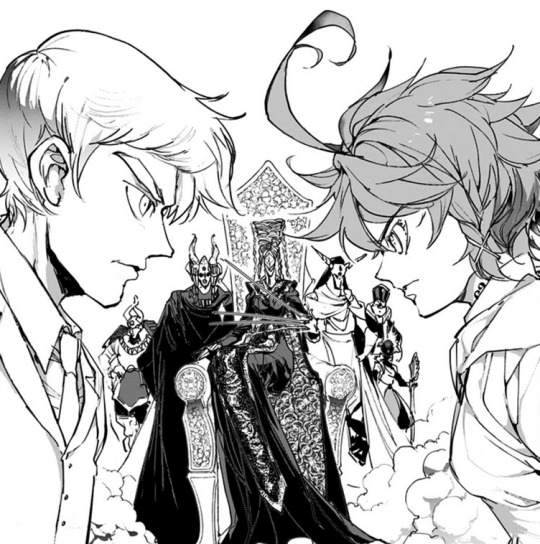
Hence, they are perpendicular: heading in different directions, and intersecting once (clashing).
It is through this consolidation of views that TPN manages to bring forth a (hypothetical) moral conflict to the forefront of its story through its characters—quite like a physical, mental, and emotional debate, wherein the protagonists each present one aspect of the moral conflict and work to achieve a balanced and unanimous outcome.
In other words, they complement each other magnificently in their opposition. Emma hopes for the impossible, while Norman works within the realm of possibility. Emma reaches for the sky, while Norman is rooted to the ground.
Norman sees the world for what it is while Emma sees it for what it can be.
#stretches#back cracks#tpn norman#tpn emma#tpn ray#the promised neverland#yakusoku no neverland#tpn character analysis#tpn#ynn#norman#emma#ray#do i dare use the ship tags#noremma#rayemma#lol#/shrug#analysis
394 notes
·
View notes
Text
ok so we're running with the philosophy of crime and punishment here about the "ordinary man" v. the "extraordinary man." essentially, in the novel, raskolnikov breaks down the world into two groups of people. firstly, there are the "ordinary" people, who don't have the ability to break the mold and create a world according to their own morals/philosophies/beliefs. they’re the direct opposite of "extraordinary" people, who have both the ability to think outside of the box and to break the mold, regardless of the human cost/sacrifice, therefore putting their own ideas into place and "paving the way" for a brighter future.
crucially, raskolnikov makes it clear that there are occasions where the "ordinary man," believing themselves to be "extraordinary," will take lives and commit moral injustices for the sake of pushing their own narrow-minded beliefs -- before being haunted by the guilt of their actions, eventually finding it necessary to confess, repent, and strive for redemption.
even more crucially, by the end of the novel, raskolnikov himself has watched his own theory crumble to the ground as he realizes that he was one of these "pretenders" -- and that, in reality, there are no "extraordinary men." he finds that morality is innate within a person, and repentance/redemption are inevitabilities once one has wronged others or their own innate sense of morality. to pretend that one is not human is to put yourself in a position higher than god himself.
what i'm getting at is that nikolai is the trope of the "ordinary man" and fyodor is the trope of the "extraordinary man" and both of them can and will be redeemed, which would absolutely fit into the existing themes of bsd as a whole. let's get it boys
first off, it’s really obvious imo that nikolai’s entire personality is essentially a mask. he wants to “break free” from the “birdcage” of human morality, but admits to feeling guilt whenever he tries to -- which is a vicious cycle that only leads him into more and more violence, as he tries harder and harder to break free from “ordinary” human morality and gain perfect control over himself and his emotions. he paradoxically recognizes himself as an “ordinary man,” and yet deludes himself into thinking that he can eventually be free if he “breaks through” his own humanity and becomes something “extraordinary” -- somebody devoid of human emotions, human guilt, and human morality.
in other words... yeah, that’s fyodor. fyodor seems to be the polar opposite of nikolai, where he’s admittedly trying to do something great: get rid of the world’s abilities. which doesn’t seem that great At First, but i mean, look at it from his perspective. his own ability only leads to death. he sees other ability users -- the port mafia/the armed detective agency’s constant fighting, shibusawa tatsuhiko, the whole doa -- seemingly only use their abilities for evil, causing further death and destruction to not only yokohama, but in shibusawa’s + fukuchi’s + potentially agatha christie’s case, the whole world. imo, to fyodor, shibusawa was the perfect amalgation of everything fyodor wanted to prove -- a singularity of a bunch of abilities wasn’t anything even close to perfect, it was nothing but a source of absolute destruction. q.e.d., all abilities are evil and ability users need to be saved from their own sins and fyodor thinks he’s the only bitch who can do it because he realizes the “crime” of his own sins and is now going out to actively “punish” for it. (see -- the scene in dead apple where he’s not attacked by his own ability because he accepts that he is both the “crime” and the “punishment.”)
this has allowed fyodor to take on the role of the “extraordinary man,” at least in theory. he has an original idea that he believes is going to make the world better. he is going out to fulfill it, no matter what the human cost is. nikolai idolizes this “extraordinary man” and is willing to go out and do anything to try to be like fyodor because fyodor, as somebody who is extraordinary, can then see through nikolai’s pretending for the “ordinary” person that he really is.
(then comes the “whoops! i’m emotionally attached to the god that i idolize! oh fuck, i have to kill him now to prove him... right? wrong? whichever one works!”)
see, the issue with fyodor’s entire philosophy is that he is only looking through the world through his own narrow-minded perspective. there are plenty of examples of characters who have “broken” through the “fundamental nature” of their own ability in order to seek redemption. just to name a few examples... kyouka accepting demon snow as a guardian and a part of her family, turning from being the port mafia’s pet assassin to a member of the ada. atsushi leashing the destructive nature of the tiger in order to save others, not allowing the trauma of his past to rule over him forever. dazai, turning away from being the leader of the port mafia in order to follow oda’s ideal of a “beautiful” world and find out what it really means to be “human.” in a sense, i would make the argument that this is the fundamental theme that runs throughout all of bungou stray dogs -- that you have to make the choice to be redeemed, you have to choose to use something that might be dangerous for the purpose of saving others. fyodor is doing this, but simultaneously entirely ignoring the fact that the entire ada is working towards the same goal -- in a different way, which allows them to accept who they are rather than being forced to lose a fundamental part of themselves. he’s caught up in his own idealization of fukuchi -- somebody who’s been betrayed so many times, he thinks that all the people of the world have to suffer before they are redeemed.
(look at that, that’s another theme from crime and punishment! raskolnikov had to suffer and struggle with the guilt of his own sins before he could resolve himself and make the decision to choose redemption, no matter what. but that’s a post for another time, lol)
imo, both fyodor and nikolai’s character arcs will inevitably lead them to redemption. they fit the roles of the “ordinary” and “extraordinary,” both of them trying to break out of their birdcages -- humanity, as a concept -- for the sake of proving a point to a world that they think is trying to control them. nikolai is trying to break through the invention of morality, fyodor is trying to attain a virtual “godhood” and a supposed moral superiority. both of them have to choose humanity in order to be saved. both of them have, subconsciously, realized the fundamental errors in their own thinking. nikolai realized that, in order to be truly free, he has to kill the only person who understands him and who he cares about -- he has to kill the literal personification of his ideals. fyodor has, multiple times, been thwarted by human emotion and, honestly, humanity as a whole -- he’s surprised by tachihara choosing to fight for his chosen family, he’s shocked that ranpo (somebody entirely human and, as dazai says, “the strongest man in the agency”) would choose to look through “kamui” and save the members of the ada.
it’s humanity -- the will to live and fight in the real world, experience real human emotions, and fight for sakunosuke’s “beautiful world” -- that allows atsushi to be both the “antithesis of ability users” but also become the world’s most wanted ability user. without humanity, abilities are inherently destructive (as in the example of shibusawa, who was devoid of humanity as a whole), but with it, redemption is always a choice that is available for you to make. it’s the realization and choice that both fyodor and nikolai are going to have to make, in the end, once their ideas and ideals inevitably crumble around them. bsd is about reconciling these "good" and "evil" parts inside of everybody -- and turning them into a unified whole that can then push on, continuing to save the people around them.
#ciphertexts#bungou stray dogs#bsd#bsd analysis#bsd meta#fake tvtropes analysis#there are some points in here that i have elaborated on in-depth in some other posts LOL but i trieddd my best to summarize them here#anyway. manifest fyodor dostoevsky chapter 91 sorry for dating this post but i HAVE to will him into existence
155 notes
·
View notes
Note
Since it's been a few weeks, what's your opinion on Chapter 8 of Arknights? Reading about your opinion on other pieces of Arknights has been very nice so far.
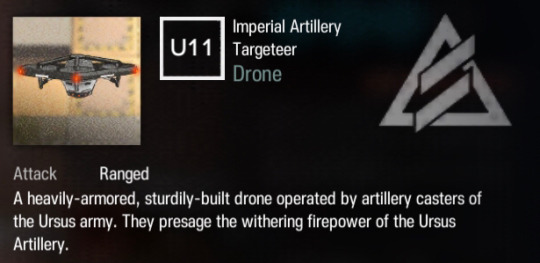
I find this enemy description inordinately amusing so I will start with this before going to spoilers below the break.
1) First of all I am a sucker for flashbacks following the villain, so the basic structure of Chapter 8 was right up my alley. Even if Talulah's arc was more or less predictable—who among us did not expect Alina to die? I think some people might feel that it was a little too long, but honestly I think it said everything it needed to say and frankly there is nothing more important the chapter could have said. If anything, the parts that weren't about Talulah would be first on my chopping list if I were editing this story down. In particular, the whole bit with Kal'tsit and the sarcophagus and all that had almost nothing to do with the themes of this chapter or the Reunion arc, so they seemed especially superfluous. Even if that story might have been interesting told on its own.
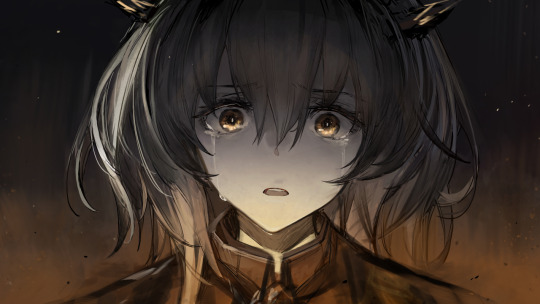
2) Talulah. The main character of this chapter, obviously. I think there are two different angles to approach her from that seem almost mutually exclusive, which are that A) she is a tragic figure who started with noble ideals but was pushed to her limits until she became a ruthless shell of her former self and B) she is literally possessed by Kaschey, ie: the Deathless Black Snake, who is the immortal spirit of Imperialism manipulating the country of Ursus into a constant state of war. From what I've seen of people’s reactions, I think most people focus more on angle B, which makes sense because that is literally true in the story, but what I took from it is that it's a lot more ambiguous than that.
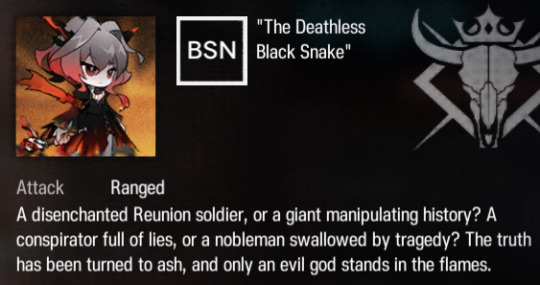
What I mean is that the story is constantly emphasizing that the Deathless Black Snake can only take action as long as Talulah agrees with it. It's more insidious than just an external ghost taking control of her (and thereby freeing her of responsibility for her actions), it's a philosophy that was planted in her by her mentor, a way of thinking, an idea. A living meme. So when I say that it's the immortal spirit of imperialism, I don't mean that as a joke, it is the embodiment of imperialism itself, of imperialist ideals and goals, manifested in this particular person the moment she starts seeing her enemies as obstacles to be eliminated instead of people with their own motivations. I certainly don't think that the trigger for the transformation was set arbitrarily, that's just Who She Needed To Be in order to buy into the ideas that Kaschey and the Snake had taught her from a young age. It’s also an ancient god taking physical control over her, but hey, it's fantasy.
Ultimately, we didn't defeat the Deathless Black Snake in battle, we just gave Talulah second thoughts. And she will live with what she's done for the rest of her life.
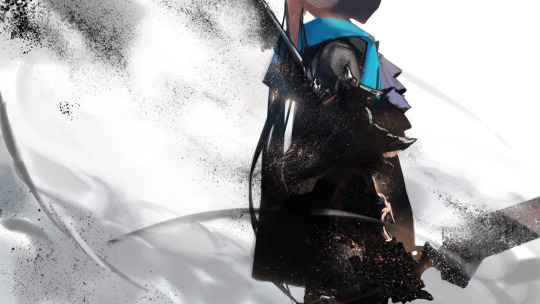
3) Amiya. In this chapter, more than anywhere else, it's clear that Amiya is the main character of Arknights. Sure, we have whatever Kal'tsit is plotting, and whatever the hell the Doctor is, but that doesn't actually matter. In fact, they spent this entire chapter walking around in the basement and never once interacting with Talulah. The Doctor shows up at the end with no idea what's going on or what happened, which is quite comical when you think about it.
By contrast, Amiya sees the big picture. Of the three people on top of the tower during the climax, only Amiya knows what both Talulah and Chen have been through, or indeed what she’s been though. What brought them all to that point. She is watching all these flashbacks right alongside us through her empathy powers. Which, as I've mentioned before, is really the best superpower in this setting: the power to see the world through someone else's eyes, and to feel the pain that drives them. And we, the players, feel what she feels. In a certain sense, she's even more of a player avatar here than even the Doctor, which I mean in the best possible way.
And of course her empathy gives her cool shounen superpowers that are suspiciously similar to Emiya Shirou, but I will allow it.
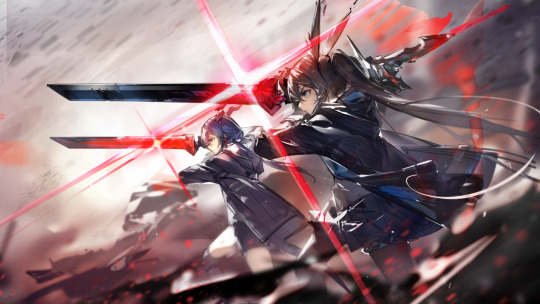
4) Chen. Chen is honestly kind of the weak link here, imo. While of course we've been following her character arc since chapter 3 and I don't mind where they've taken her, it ironically kind of felt to me like she had no personal stakes in the final battle. Which is odd since the story seemed to be hammering that it's all personal for her, what with Talulah being her long-lost sister and all that. The problem (imo) is that her close relationship with Talulah is all Told-Not-Shown, and also that Talulah is being possessed by the Deathless Black Snake, so it kind of feels like she's being left out of the loop, both in terms of knowing the facts and also emotionally.
I'm not saying she doesn't get any good lines, or that her banter with Amiya isn't cool or funny, I'm just saying that what should have been a big emotional moment at the climax of the story just sort of fell flat for me, and I was left wondering "wait, why is Chen here again?"
That said, I did enjoy her bit afterward where she's like "you need to stand fair trial for your crimes, Talulah, but in this world that discriminates against the Infected, there’s nowhere worthy of giving you one." I feel that sums up the game's stance on these things quite succinctly.
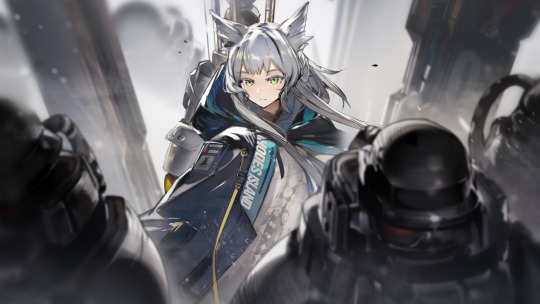
5) Rosmontis. Rosmontis had sort of an interesting arc here because it separated her from Amiya and I almost want to say that was a good thing? While I thought her relationship to Amiya was one of the most interesting things about her in the previous chapter, it almost feels like it was preventing her from forming bonds with other people and becoming a more well-rounded person? I guess what I want to say that is that Rosmontis was being coddled, sheltered, treated as a child. While some would call her a monster, Amiya was always around to say "no no no, don't listen to them, you're cute!" And while that was certainly nice of Amiya, it feels like what truly made her accept herself was almost the opposite: being accepted as a monster (or rather, a person with monstrous powers) by people used to fighting alongside monsters. Being told that she's allowed to hate the people who hurt her, and to be ruthless to her enemies. That her own emotions, both good or bad, are valid. For the first time, she felt human.
What you'll note, of course, is that these aren't exactly heroic virtues, and in fact they're kind of similar to what Amiya rejects and what got Talulah into so much trouble? Honestly I don't know if I would say Rosmontis is a good person right now, but what she is doing is thinking on her own for the first time, and deciding what's right and wrong for herself. It sounds almost malicious to put it this way, but it's like Amiya and Rhodes Island were trying to mold her into someone she's not. In some ways the opposite of what Kaschey did to Talulah.
I don't think her story is over yet, of course, but I found it an interesting direction to take. Rosmontis is on the path to find her own justice, which may or may not align with Rhodes Island's.
Also, kitty:
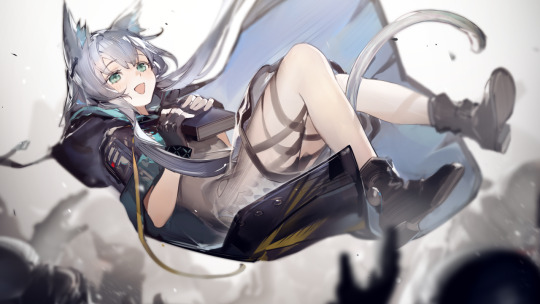
6) W. Back when I was doing a write-up for chapter 7, I said that maybe she would have been better off being recruitable in chapter 8 instead of 7, because it seemed a little early in her arc for that. I was wrong. She wouldn't fit in for chapter 8 either. Honestly she probably shouldn't be recruitable at all right now, not that I'm complaining as someone who uses her. Just, you know, narratively she is not at a place where she would consider joining RI, and in fact she ends the chapter pretty much going "later losers, I hope we never meet again." Which implies that the W in my squad right now is like a totally different person who is either from an alternate dimension or the future, after a lot of character development. That's not like the worst thing ever, it just seems a little weird to have her right now. W's story isn't about Reunion and never was. It's about Theresa and Babel, which as of now we are still only getting little hints of. I'd be glad to see that story when it happens, but until then W's just kind of there.
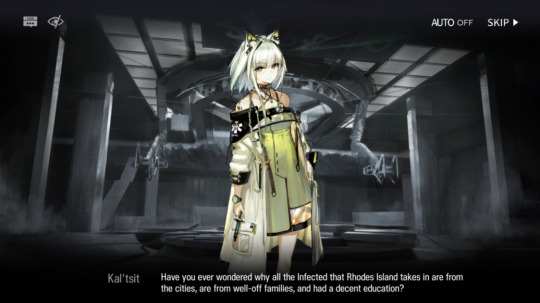
7) Themes. For some reason, this one line in this chapter really hit me. While it's not literally true, especially if you count all the former child slaves or feral children and whatnot, it does feel broadly true that most of the characters come from middle-class backgrounds. Like, your Krooses and Orchids of the world. Kal'tsit goes on to explain that this is because RI can only really recruit in cities, and that rural Infected tend to get thrown into the wilderness on their own and have no idea that RI exists.
Interestingly, this idea also sort of comes up in Talalah's side, when it's revealed that Talulah is the daughter of a duke, making her followers hesitate for a moment. While I don't recall it being explicitly spelled out, the implication was obviously that she's not "one of them" and this might be a cause for distrust. But what are "they' exactly? Clearly she is in fact Infected, she made sure of that herself. But she wasn't abandoned in the same way her followers were. She had a choice, and chose to side with the Infected. Which is honorable of her and all, but it also indicates a fundamental disconnect between them because they never had a choice. She could've used her influence to hide her oripathy and be treated like a normal person (as we saw happened with both Chen and Patriot), or used her wealth to get sent to a fancy private hospital like Rhodes Island, with the latest medical technology and treatments.
So while the story focuses on the discrimination of the Infected, it's clear here that that's not really the only thing going on. Being Infected means little to those in power, while for those without power it's just an an excuse to intrude on their lives and make sure they aren't "harboring any Infected" or whatever. Basically the story starts discussing intersectionality, which I found interesting.
8) This is a good line:
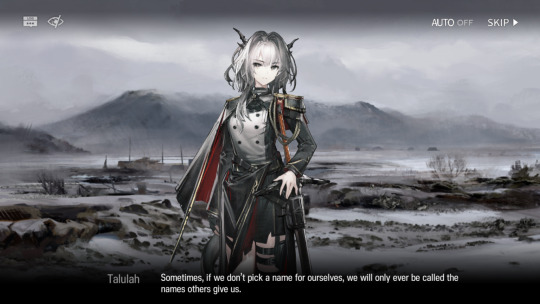
#not touhou#arknights#chapter 8#roaring flare#if we don't pick a name for ourselves we will only ever be called the names others give us
87 notes
·
View notes
Text
Ame Trio's Personalities: Nagato
I want to share some thoughts on the Ame Trio/Ame Orphans because I do think they have one of the most complex, interesting and beautiful arcs in the Narutoverse.
I will discuss their personalities and thoughts. This post is about Nagato, there are also Yahiko and Konan.
(2/3): Although Nagato is the main character of the trio, he's the second one to be analysed because he's influenced by Yahiko's death while his own death shifts the direction of Konan's life.
NAGATO:

Also available in Russian: ссылка на русский перевод
Nagato is an extremely complex character; he is both the first and the last to appear in the trio. The first, because the first time he appears is as Tendo Pain (Divine Path) - the last, because he is the last one to be shown in his original form. For a brief while, we are led to believe Yahiko is Pain until we are shown the shy red-headed boy was the one who had the rinnegan all along.
The complexity of his personality, in my opinion, comes not from his act as "Pain", or from the heavy traumas which he was inflicted, but from the fact that Nagato was not built as a "classic protagonist", but he was given that role by the other characters in the story, and eventually took the role when the situation left him no other choice.
It's important to consider the original Akatsuki's/Ame Trio's dynamic to understand Nagato. In their original form, Yahiko was the leader; he was the one that inspired the others, especially Nagato. We are never shown any kind of dispute or conflict between Yahiko and him; Kishimoto doesn't even pull the classic "love triangle" on them - doing, in fact, the very opposite by making it clear Nagato knew about their relationship and supported it.
Nagato lacked one of the most important characteristics of villains; ambition - the very personality trait Yahiko had in abundance. Of course Nagato had ambitions of his own (wanting to find the peace and breaking the curse of hatred), but having great goals does not make him an ambitious person. We are never shown Nagato actively pursuing being the best in the trio, the most powerful shinobi in the world, we are never shown any desire of him ruling Amegakure on his own - he never had the desire of being in the spotlight.
Although Nagato wanted to find peace for the world- he even told Jiraiya that he would be the one to break the curse of the never ending wars -, we're shown that later on he believed Yahiko was the one more fit for the power. This is very opposite to the personalities we are shown of Madara and Obito, who both competed against their "friendly rivals" and had high personal ambitions (very much like Naruto also did). If there was any kind of competition among the Ame Trio, it was mostly Yahiko against himself - Nagato never saw him as a rival or opponent of any nature.
The story - with the intent of confusing us by not making it clear if Pain is Yahiko or Nagato - shows us Nagato is the owner of the immense power, but lacks the personality to act on it enough to become a villain. Although it's true Jiraiya proceeds most of the fight believing he is fighting against Nagato himself, the story is still built in such a way to make us wonder how could power-hungry Yahiko die and how on Earth did passive, quiet Nagato become a megalomaniac pseudo-God.
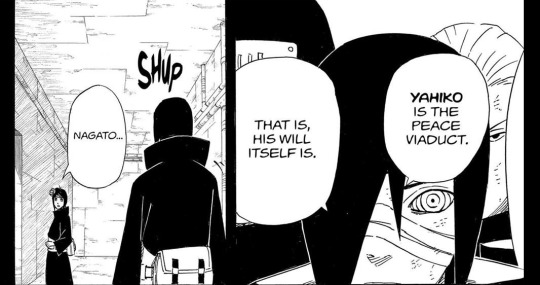
Nagato is an extremely realistic character when it comes to his relationship with the rinnegan; it's not logical to think every person who possesses immense power has the desire to use them just because it's available.
In the situations where Nagato is not dealing with violence or his powers, he is shown to be a shy, kind-hearted person. Physically, his appearance is fragile, which only highlights other aspects of his personality such as his quietness and passiveness - traits he shares with Konan - and his sensitivity, a core trait he shares with Yahiko. Jiraiya's memories of them as children, as well as Konan's memories of them at different ages, show Nagato hardly ever speaking, barely dragging attention to himself - introspective, but also curious and determined.
Nagato, prior to Yahiko's death, is always shown having a complicated relationship with his powers; he is partly afraid of them, he doesn't completely understand them and in turn he doesn't completely trust himself - this inability to build a proper self-confidence also leads him to be more quiet and hesitant than he would naturally be. An example of this is his first interaction with Obito, where Nagato is clearly shown being affected and unsure of what he should think about "Madara's" proposal (Chapter 607, further explored on the mixed canon-filler anime episodes of that same arc).
Despite the mixed feelings he has towards the rinnegan, he also expects a lot from himself; both because he is powerful, and also because a lot of expectation is put on him to by others.
Following the death of his parents (which is an extremely heart-wrenching trauma on its own), Nagato slowly stopped being fully human and was put in a odd pedestal of Reincarnated God; he was still a mere mortal like the other two children, but expectations were extremely high. He had the eyes of God, he was eventually going to figure out the answer for peace. He had to.
If he had been chosen by the divine to possess the eyes of God, naturally it also meant he was the one who would eventually find the answer to peace.
It's easy to see evil Nagato with his God Complex and blame it solely on his own arrogance, but it's important to understand the circumstances in which Nagato started dehumanizing himself actually began with Jiraiya and continued later on with Yahiko, especially on his death. Jiraiya may not have had the intention of dehumanizing him by telling him the divine status of his powers, but, by placing on him the responsibility of finding an answer because of his eyes, he lead Nagato to start seeing his life as something that obligatory needed to have meaning; of course, this didn't fit well with his preference for following instead of commanding and overall lack of self-trust - it only generated him more stress and suffering.
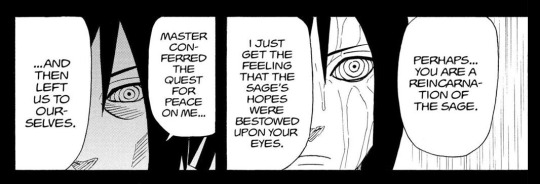
Although those feelings were planted in Nagato during Jiraiya's training, they remained dormant because of the Ame Trio's dynamic. Yahiko was the one who had the abilities of a natural leader and he was the one to develop a philosophy to find peace in the world. We see that Nagato was content to support him, and mutual support was a characteristic of all the Ame Orphans.
Nagato loved Yahiko deeply; Yahiko had not indirectly saved his life (by helping Konan to keep alive) and maintained him alive by giving him food and shelter, but he had also given Nagato reasons to stay alive. Pursuing the dream of achieving peace, creating a better life - Yahiko gave Nagato a sense of purpose, a direction to move forward, something he could fight for after he had lost everything.
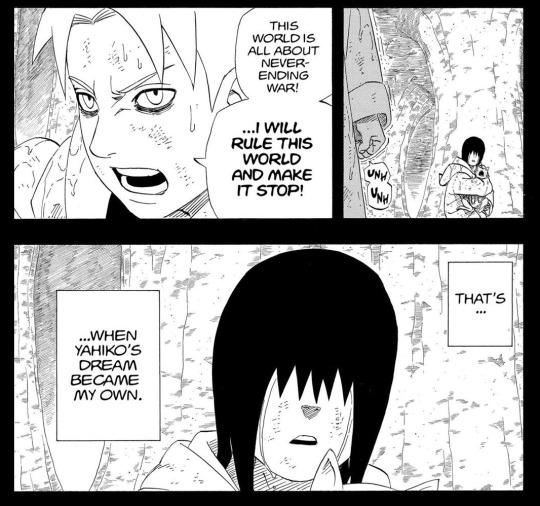
It's implied that during their time together, Nagato believed his divine purpose was to support Yahiko on his quest to find peace - we are shown many times Nagato never questioned Yahiko. They had a healthy and friendly dynamic; Nagato's natural passiveness never clashed against Yahiko's dominance, and Yahiko offered him the emotional and existencial stability he desperately needed. By seeing in his life the purpose of following and supporting Yahiko, Nagato's philosophical suffering was eased by having some answers to many of the questions regarding the reason he was gifted with his powers.
Nagato was never shown to be dissatisfied with the path he was walking with the Akatsuki; the meaning of his life was clear - helping the Akatsuki achieve peace. We have much evidence to believe Nagato was a happy person, content with the life he had built for himself, which also sets him apart from many of the other Naruto villains who had a deep desire to take matters on their own hands and change the world around them; he was not a naturally ambitious person who wanted more than he already had.
Nagato's happiness and hope in life being taken away from him twice is what sets a fundamental change in his personality.
Yahiko's death meant the purpose he had for his life had been destroyed. There was no perspective of the future without Yahiko's guidance, and even Yahiko's ideals could not work in a world that ultimately took advantage of his philosophy.
Nagato was stripped away from all remaining happiness and motivation he had gathered again from dust. Everything he had built with Yahiko and Konan and the original Akatsuki was ultimately meaningless because it didn't protect him against being a victim of the same situation twice.
The meaning of everything had been destroyed. The one person who had kept him alive all this time was dead - all their efforts were in vain. His life was pointless; he had nowhere to go, nothing to fight for, no ideal to believe in - no one but Konan, feeling just as lost and empty as he was. The person who had always provided them with hope and meaning was gone.

It's important to highlight how Yahiko sacrificed himself to save Nagato and Konan. It was not Yahiko's intention when he decided to take such action, but by giving up his life for Nagato and telling him he was "the savior of the world", Yahiko ended up creating an enormous pressure on Nagato to not let his death be pointless. Jiraiya had already put the pressure of finding peace on Nagato's shoulders - Yahiko's last words and actions ended up making it nearly impossible for Nagato to ignore the divine role he was put in.
The divine role given by two figures he respected and followed was the only thing (despite Konan) that Nagato had left after Yahiko's death (and Akatsuki's massacre, according to the anime); being the God that could save the world was the only purpose left in his life by the people who had previously guided him.
I see many people regarding Nagato as simply arrogant and/or narcissistic and I think they are not giving much attention at just how dangerous it can be to put people in labels, because more often than not people will grow and change to attend the expectations others have of them - especially if they are going through a desperately painful existential crisis like Nagato goes after Yahiko's death.
This kind of existential suffering also leads people to grasp onto every little thing they can that makes them remotely happy; visually, this is shown with Nagato and Konan never letting go of Yahiko's body, maintaining him symbolically alive.
Nagato's philosophy is simply a more cynical version of Yahiko's cycle of hatred - the fundamental change was in the core ideal; the possibility of people ever being able to understand each other. Nagato knew from personal experience how the everlasting cycle of pain worked, and if he truly was Divine as he was told by other characters, then he would force people into finding understanding in shared pain and fear.
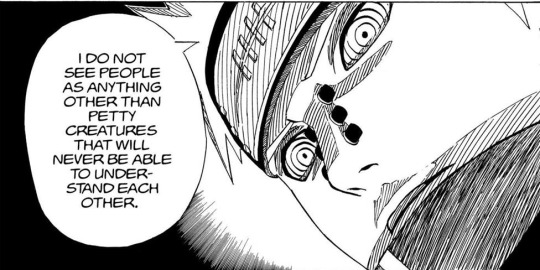
Dissociation is a defense mechanism both Nagato and Konan relied on to survive situations that were near-impossible to recover from given their context; neither had any sort of physiological support and were also unsafe, hunted by the enemy who had just killed a person they loved. The vendetta against Hanzo was also an action of self-defense and survival - a survival Yahiko had always told them to pursue no matter what the cost was. The situation didn't allow Nagato a safe situation for him to breath; he had to act and keep himself and Konan alive.
Taking the role of God - and even being called by a different name, "Pain" - Nagato could distance himself from his actions and rationalize them; eventually, being able to turn every one of his actions into being the undisputable will of God turned him into the narcissist Jiraiya encounters in Amegakure. This type of rationalization that involves the taking of a role given by others as well as a change in name and appearance keep a person from confronting the reality of their actions; another extremely famous example of this is Anakin Skywalker/Darth Vader.
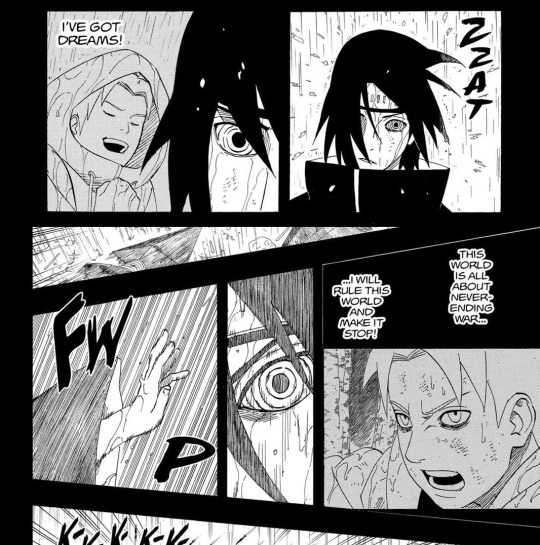
Nagato takes it a step further by blurring the lines between his own feelings and the divine label given by others with Yahiko's dreams and his own feelings regarding Yahiko. By using Yahiko's body as vessel and keeping him symbolically alive, Nagato not only prolonged his own suffering but also incorporated some of Yahiko's personality - unlike his shy original self, Nagato as Pain became stoic and confident; his demeanor is like that of an adult dealing with children - a God who deals with mortals who are incapable of understanding his divine enlightenment, as he explains to Jiraiya. When Naruto confronts him personally, Nagato displays a more cynical, sarcastic self by letting go of his divine persona.
Nagato becomes the narcissistic villain with a God complex because this is the only thing that he has left after everything is stripped away from him, in ways more painful than he can endure without help; Konan cannot help him, being herself in the exact same situation as he is. Even so, it's important to understand Nagato doesn't really believe he is a God - his divine status extends only to the point where they can justify his actions and explain why he is the one who must establish this new peace. This is clear when he talks to Naruto and he shows how he, in many ways, sees himself and still being the same person he was when Yahiko was still alive - a peacemaker. In his own words, they were all "ordinary men" (Chapter 436).
Nagato, at that point in his life, has nothing to lose; he knows, in the event of his failure in capturing Naruto, Konan or "Madara" will continue on the pursuit of creating the ultimate weapon for peace. Nagato has already lost so much, and he's not building a future for himself to enjoy - rather, the peace he means to create is both a way to give his own life meaning and also make Yahiko's death not be pointless. It's important to understand that peace is Nagato's ultimate goal, and his own ideas were never something he valued above anyone else's - after all, he spent half of his life following Yahiko and the other half in the effort of continuing his (their) goal.

So, although Naruto's "talk no jutsu" is perceived as weak from part of the fandom, I personally don't see Nagato as the combative, ambitious type of person; the actions he lead on his own were heavily supported by Konan and influenced by "Madara'', because his original nature was much more passive than the one he displays as a villain. Not wishing to lead or not being truly comfortable with creating a revolution is not a flaw - that simply is not Nagato's nature; if he wasn't like that, he would have probably clashed against Yahiko at least once, which he never came close to do.
Given that, it's not outrageous that Nagato decides to believe Naruto after hearing Naruto repeat his own words; Nagato, like Konan, is a person who supports others, they spend half their lives following one and the other half being influenced by another. This time, Nagato finds someone who actually pursues his original goal, a person who attempts to understand him, who faces a suffering similar to which he endured and was still able to maintain faith. In that sense, Naruto's philosophy is much more attractive than "Madara's" plan, as it alligns with what the original Akatsuki was all about.
Naruto was a person worth believing, worth sacrificing himself for as Yahiko had previously done for him; Yahiko's life, the original Akatsuki's efforts, all of their actions wouldn't be pointless if Naruto succeeded.
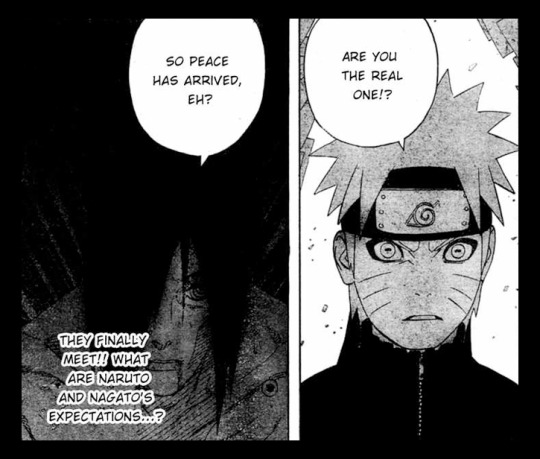
(Edit: I can't believe I forgot to write about one of Nagato's personality traits which I like the most. Although I have previously mentioned that Nagato is quite a shy person, he can also be incredibly sarcastic and teasing. I'll highlight a few moments such as: in the Pain Arc, he tells Naruto they can expect to understand each other for having the same teacher - which later on he explains was a joke; his unimpressed reaction upon meeting Naruto himself in chapter 443 as shown in the image; in the Edo Tensei arc, chapter 549, he makes quite a light-hearted remark about being able to move using the Animal Path summonings and even Naruto is surprised to see him making jokes; In the mixed filler-canon episodes of Obito's memories in the anime, Nagato notices Yahiko is jealous of Konan and teases him for it).
Nagato was not a "classic protagonist"; he wasn't a person who wanted to prove his value to everyone, he didn't want to change the world with his own hands and ideals all by himself - he was forced into the role of protagonist to survive in a context that lead him to take the path of becoming a villain. When Nagato felt he could finally abdicate the position of protagonist, he did.
This is not to justify Nagato's actions; he lacked the emotional intelligence that made Yahiko so different from him. If he had such a trait, he wouldn't be able to carry on much long with rationalizing his feelings and dissociating into the role of God without confronting himself - Nagato did get lost in his own arrogance and megalomania, but it's important to consider the context of his actions. Nagato didn't only have to survive physically, he had to survive mentally as well - it's hard to think how he could deal with the situation in a different way without having any external help.
Nagato's dilemma with peace and the answer were present from the beginning; when he finally had a satisfying answer, he found peace.
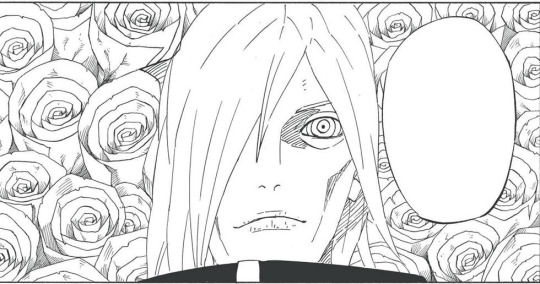
#nagato#meta#mymeta#naruto#uzumaki nagato#analysis#character study#character analysis#naruto meta#amegakure
105 notes
·
View notes